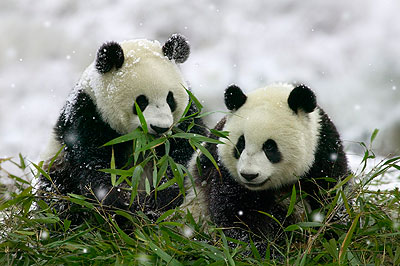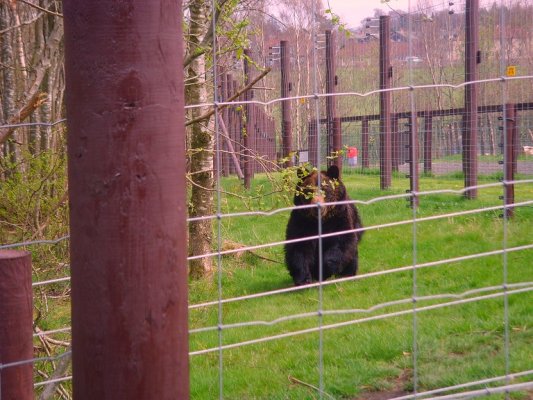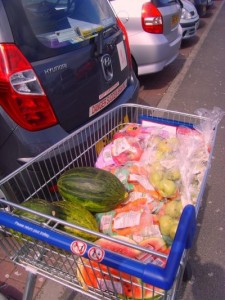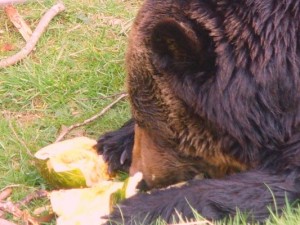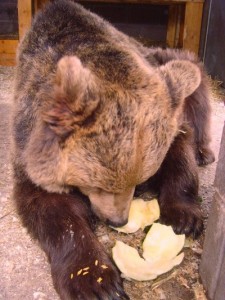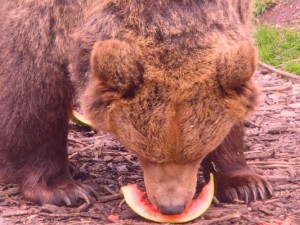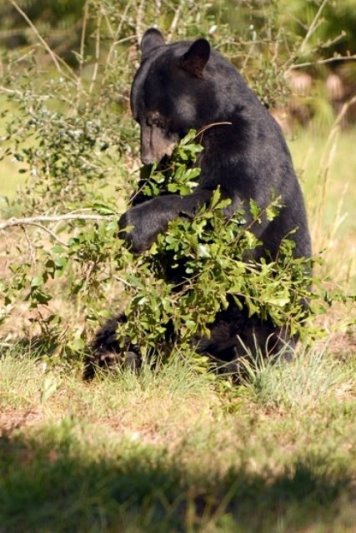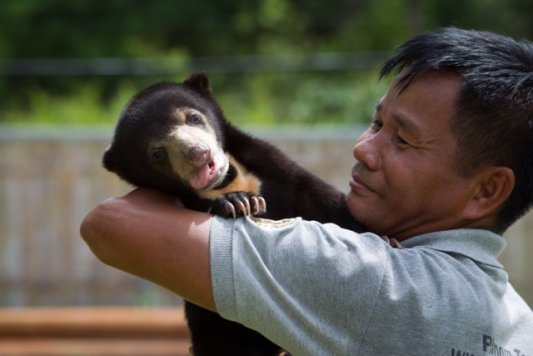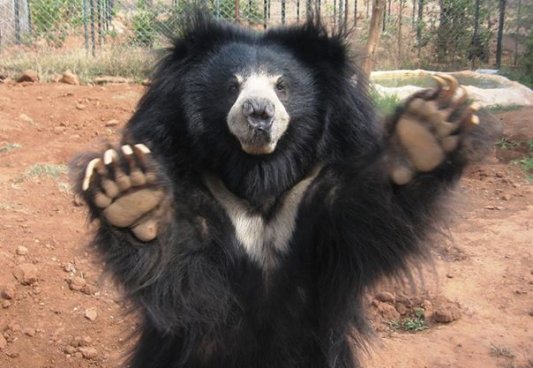One aspect of the Winton Foundation for the Welfare of Bears’ work is to support new and established projects around the world that help rescue bears that are suffering and in need, and care for them from that point on.
At regular intervals, we will provide financial assistance and support for these projects, cementing our efforts as part of the global network of organisations working to prevent the abuse and exploitation of bears. Please find below more detailed information about the projects we are helping, along with some lovely pictures.
- Advancing Bear Care Conference
-
Advancing Bear Care Conference 2013
We were delighted and very proud to announce that, as part of our inaugural Bears Matter Month, we were working with the renowned Else Poulsen and the Bear Care Group, and were providing a sponsorship for their 2013 Advancing Bear Care conference in the United States. The conference is held every two years and brings together some of the greatest ‘bear’ minds in the world. The sponsorship covered the cost of one delegate’s registration fee.
Advancing Bear Care Conferences 2015 and 2016
The 2015 conference was held in Vietnam at the end of October. WBF once again provided sponsorship but this year we did it slightly differently to be most effective. The Bear Care Group who organise the conference wanted to offer less expensive registration fees for delegates from 3rd world countries, which meant for the same amount of sponsorship from us as made in 2013, more delegates could attend from countries where the bears’ needs were greatest. Therefore we provided sponsorship of US$300 (£200).
In 2016, we sponsored a coffee break at the Advancing Bear Care 2016 Conference to encourage networking, providing £210 (US$260) for this purpose.
Once again in 2018, we provided £203 sponsorship to the Advancing Bear Care annual workshop & conference held in Agra, India in December. The Bear Care Group creates and enhances communication, cooperation and education among international bear care professionals. Our sponsorship contributed to the costs of enrichment for the sloth bears at the workshop during a field visit to the Agra Bear Rescue Facility.
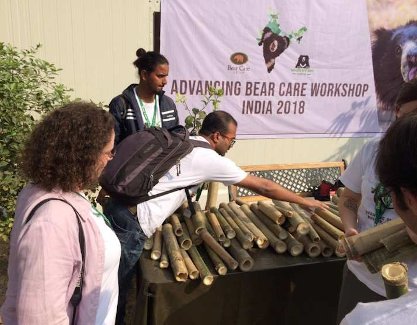
ABC workshop in Agra, 2018
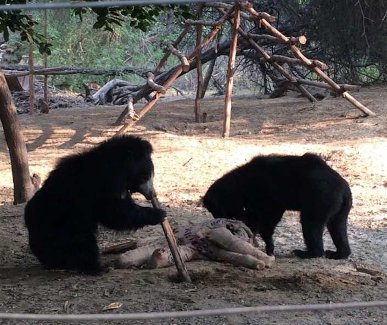
Sloth bear workshop
Captive torpor presentation, 2019
In winter 2019 we once again supported the Advancing Bear Care Conference, held this year in Scotland, by sponsoring a presentation on “The Development and Benefits of Captive Torpor in European Brown Bears” (starring Fluffy & Scruffy, our beloved adopted bears!). The presentation was delivered by Jonathan Forde, Senior Keeper Hoofstock and Bears, The Wildwood Trust, Kent. The conference partner this year was Five Sisters Zoo – you may recognise some of the delegates in this photo taken at the zoo. The delegates attended a hands-on practical workshop giving them a chance to practice welfare assessments after learning about the environmental, physical health, and behavioural needs of bears and how seasonality plays a role in their welfare.
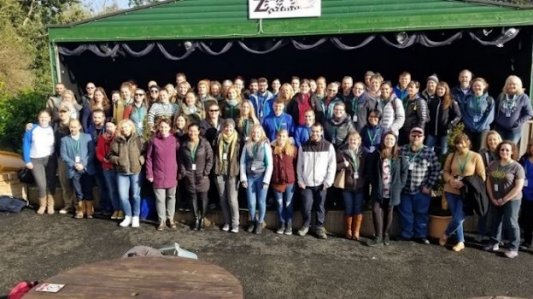
Photo credit: The Bear Care Group
- Andean Bear Foundation
-
Andean Bear Foundation
The Spectacled Bear is one of the world’s rarest species, under severe threat from hunting and habitat destruction. In July 2011 we contributed £100 to the work of the Andean Bear Foundation to save this unique bear from extinction through their in-field scientific studies and through the rehabilitation and release of captive bears.
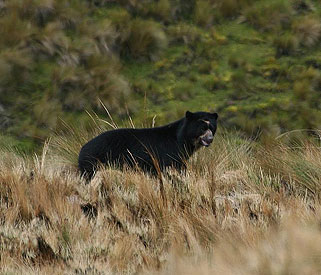
Patricio Meza Saltos/SIMBOIE
- Animals Asia – China Sanctuary
-
Animals Asia – China Sanctuary
In April 2011 we made our first contribution to Animals Asia’s Bear Enrichment Programme. The programme significantly improves the lives of bears rescued from bear farms by helping to allow them to play, have fun and express normal behaviour which in turn can reduce their fear and distress, reduce discomfort and help reduce pain, injury and disease.
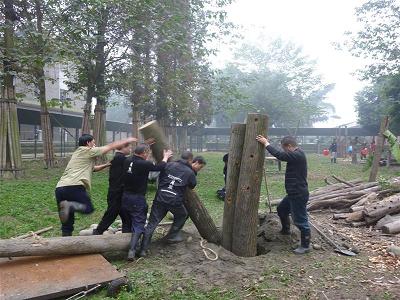
The building of the log wall, courtesy of Animals Asia
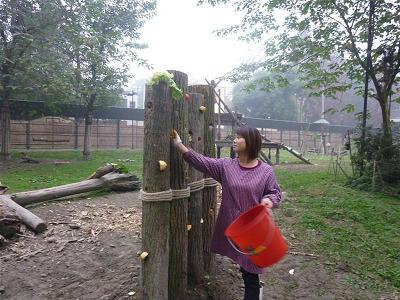
The log wall being stocked with goodies for the bears
The bears forage around for the food in the log wall, stimulating their natural instincts. The funding also covered the cost of a fire hose hammock and, true to form and poignantly symbolic, the first bear to try out the hammock was our adopted bear, the gorgeous and mischievous Bodo!
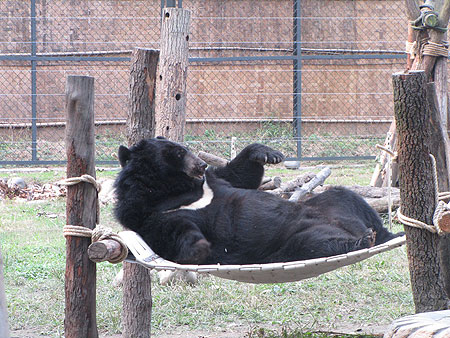
Beautiful Bodo – chilling out in his present from WBF!
We were delighted to have this donation marked with a lovely plaque.
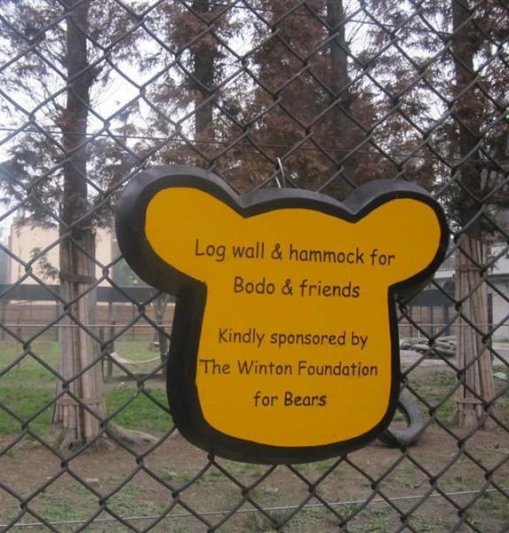
Our plaque!
The Winton Bear Foundation is extremely proud to be able to continue to support Animals Asia’s incredible work to rescue bears from the brutal bear farming industry. The ongoing care of these severely traumatised bears after rescue is vital and we are staunch supporters of Animals Asia’s wonderful ‘Bear Enrichment’ program which provides toys and play structures that stimulate the bears and help them exhibit natural behaviour – an immensely important aspect of the bears’ recovery. ‘Bodo’ is WBF’s adopted bear (read about him above) but we also have a special place in our hearts for Oliver, a truly remarkable bear and we are delighted to be covering the cost of some special toys for Oliver and his friends. This is Oliver’s story…
Unbelievably, Oliver spent THIRTY years trapped in a cage suffering the torture of bile extraction and being confined in a painful, heavy metal jacket. When the Animals Asia team found him, they were faced with a sad, distressed and physically damaged bear. He was unresponsive and in constant pain. He became known, affectionately as their ‘Broken Bear’.
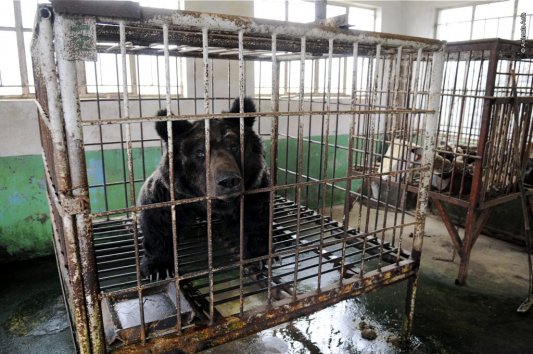
Oliver, incarcerated for 30 years (photo courtesy of Animals Asia)
After release from his cage came the journey from the farm back to the sanctuary. During this journey, Oliver’s condition deteriorated rapidly due to the bear farm owner having ripped the catheter that had been embedded for years, out of Oliver’s abdomen.
Under the most dreadful of conditions, the Animals Asia veterinary team had no option but to perform emergency surgery in the back of the truck where Oliver underwent a four hour life saving operation to remove his damaged gall bladder. Thankfully, there was an immediate improvement in Oliver’s condition – perhaps this poor, sorry bear’s luck was changing at last.
Oliver’s joy at being released from his cage was plain for all to see and he loves his new home at Animals Asia’s Chengdu Sanctuary. Considering he spent 30 years – normally the lifespan of these bears in a cage, he is now a curious, inventive and active bear! He is stimulated and happy… and free.
However, due to the dreadful treatment Oliver suffered he is not as physically active as some of the younger bears who are more able to fill their time with rough and tumble games, so it is vital that Oliver can be given other activities to do to keep his mind and body active. Despite his stunted legs from being caged for so long, he loves playing in the water and with all the sanctuary toys. In this picture, he’s obviously a keen fundraising as he appears to be running a tombola!
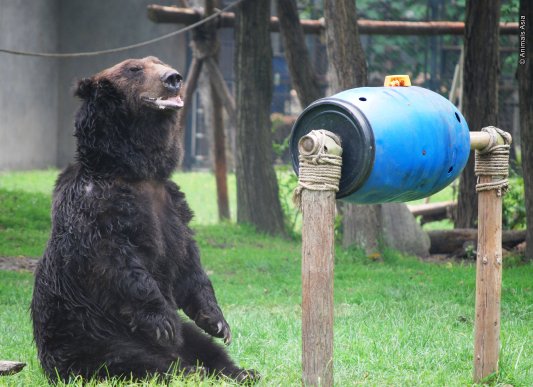
Oliver running a tombola (photo courtesy of Animals Asia)
We would like to continue to help care for Oliver and assist his recovery, so we have funded some special toys, appropriate for Oliver. We have purchased a selection of enrichment toys including 3 white canisters and some bamboo for making toys. These toys are used to hide treats and food in to encourage the bears’ natural foraging behaviour, staving off boredom as they spend lots of time trying to get the piece of yummy fruit or veg out of it. The bamboo toys in particular are used in the enclosures and for bears recovering from hospital treatment so you can imagine how important they are to the bears and the team (more photos to follow).
In January 2013 we made a donation of £100 to Animals Asia to buy something for the six new bears they had just rescued from bear farms in China. Our donation was used to buy a new stereo so that the bears could be played calming and relaxing music while they were in their recovery cages to help them settle into their new home and recover from their horrendous ordeal – here they are listening to their new stereo.
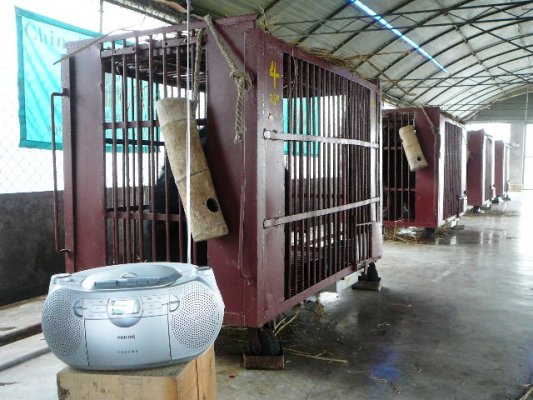
Quarantined bears listening to their new stereo.
(photo courtesy of Animals Asia)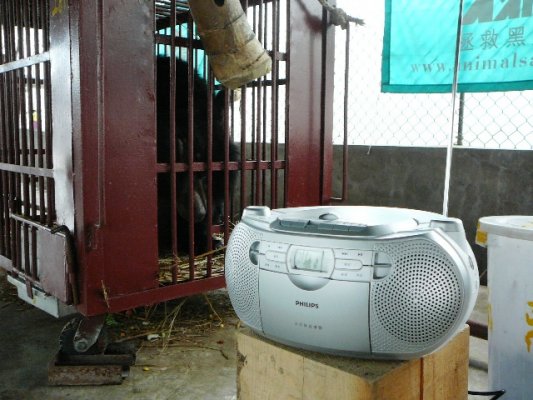
Xuan Xuan checks out the new stereo.
(photo courtesy of Animals Asia)In July 2013 we bought £60 worth of bricks to support Animals Asia’s appeal to secure their sanctuary walls following the horrendous floods in China and the resulting damage to their Chengdu sanctuary. The sanctuary will be strengthened against future flood risks, keeping their bears safe and sound.
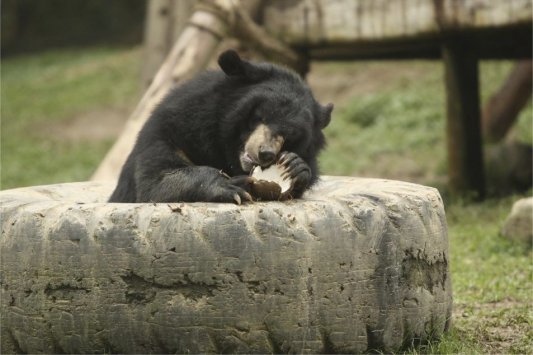
Cromwell is taking advantage of the large truck tyre, resting his coconut on it
to make it easier to eat! (photo courtesy of Animals Asia)The Winton Bear Foundation is very proud to be working in conjunction with Animals Asia to help promote their Peace by Piece project in Scotland.
Animals Asia’s Peace by Piece initiative is a historic breakthrough in the ongoing campaign to end bear farming and will see the charity converting a bear bile farm in Nanning, China into a sanctuary, ending the suffering of the 130 bears and their unborn cubs farmed there and releasing them from a lifetime of mental and physical torture. This ground-breaking turn of events has come about following a change of heart by the bear farm owner Mr Yan Shaohong who no longer wished to see his bears suffer and wanted to get out of the increasingly unpopular industry.
Animals Asia are required to raise £3m to transform the farm into a sanctuary in the biggest rescue of its kind, which will eventually include taking 28 of the sickest bears on the farm to the safety of their sanctuary in Chengdu where they will be given the urgent veterinary care they need. The charity will then begin the two year process to turn the farm in Nanning into a sanctuary and haven of peace for the remainder of the bears so that they can start to recover from the trauma of their ordeal on the bear farm and that their care and wellbeing will be guaranteed for the remainder of their lives.
The Winton Bear Foundation will provide support for this project, and Animals Asia’s ongoing battle to end bear farming, through fund and awareness raising until bear farming is brought to an end once and for all.
In February 2020 we responded to an urgent appeal from Animals Asia. Hong Kong-based animal welfare charity Animal Asia’s bear sanctuary in Sichuan, right next to the epicentre of the Covid-19 outbreak of Hubei Province, urgently needed veterinary supplies to stay afloat. The Chengdu sanctuary houses 250 bears in 11 houses and 15 natural and semi-natural enclosures. As cities and transport links across China came to a virtual standstill, the sanctuary’s supplies dwindled to vulnerable levels. We sent an emergency donation of £100 to their Crisis Action Fund to help keep the China Bear Sanctuary alive.
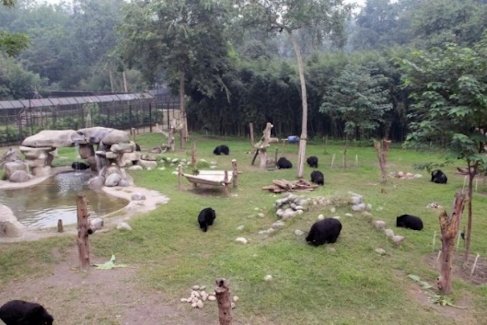
Animal Asia’s China Bear Rescue Centre, Chengdu
Photo Credit – Jill Robinson - Animals Asia – Vietnam Sanctuary
-
Animals Asia – Vietnam Sanctuary
In November 2011 we funded another two fire hose hammocks, this time ones that were desperately needed by the bears and cubs in Animals Asia’s Vietnam Sanctuary. Bill was the first to inspect the new gift, and after testing if it would take his weight he gave it his full approval!
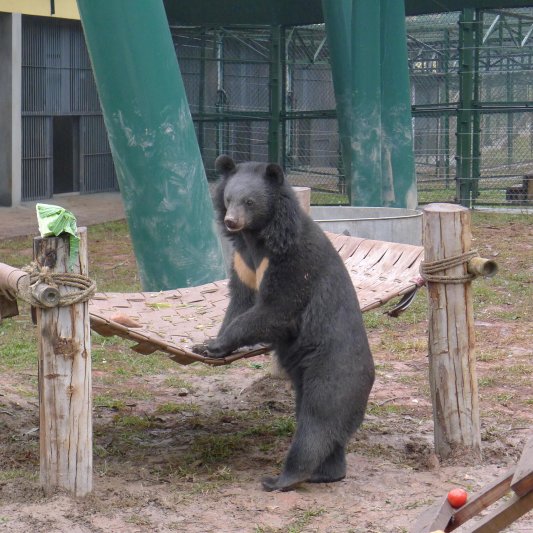
Bill testing out the hammock WBF bought for the Vietnam Sanctuary.
Photo courtesy of Animals Asia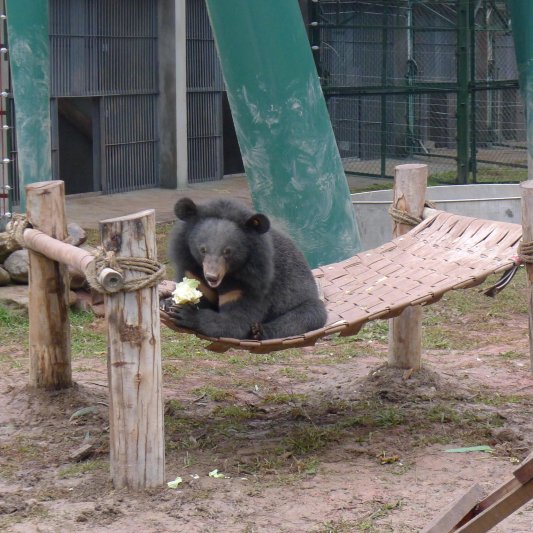
Bill deciding that the hammock’s ok!
Photo courtesy of Animals Asia.Bear lovers will recall with great sadness the threatened eviction of 104 of Animals Asia’s beloved rescued bears from their Vietnam sanctuary at the end of 2012. Following the wonderful news that the eviction was overturned, we at the Winton Bear Foundation decided to buy a coconut for each and every bear in the sanctuary, as a special treat so that they could celebrate staying in their new home. We received this lovely thank you from the Vietnam team and take great pleasure in sharing the photos. Some of the bears preferred to throw some yoga poses and rub the coconuts on their heads – well, we never said they HAD to eat them! Enjoy!
“Animals Asia’s bear rescue centre in Vietnam received a very kind donation from the Winton Bear Foundation. The donation was made after the bear rescue centre was saved from eviction. The team purchased whole coconuts, one for every bear, which is a real treat for the bears as it is a novel, long lasting and tasty food item. Only our sun bears receive coconuts every week and they are cut in half. But this time around all our bears in the centre were able to fully enjoy the pleasure to play with coconuts, work out how to open them and get rewarded with the fresh juice and the tasty flesh. It took many of the bears a long time to work out how to open them, most thoroughly enjoyed rubbing the coconut with the brown husk all over their body before dropping it onto the ground. After repeated drops the coconut would finally break open. We have a group of disabled bears at our centre too, most of them missing part of their front limb. They were given the advantage of an already split coconut so they too could enjoy the tasty flesh inside. On behalf of all the bears at the Vietnam bear rescue centre, a very grateful thanks for such a thoughtful donation!”
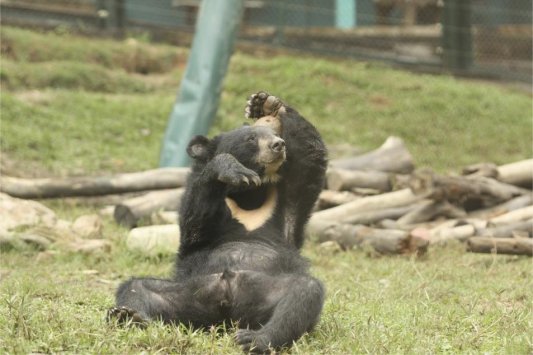
Yin Yang enjoying the feeling of the coconut husk on his head!
(photo courtesy of Animals Asia)
Cromwell is taking advantage of the large truck tyre, resting his coconut
on it to make it easier to eat! (photo courtesy of Animals Asia)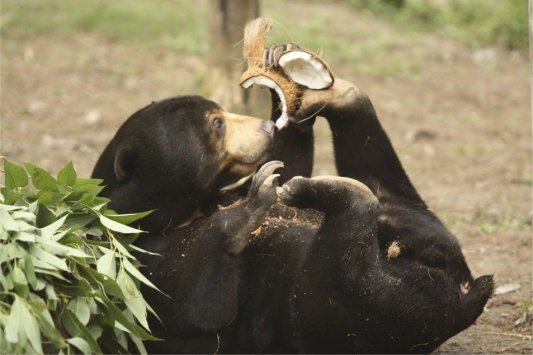
David the lovely Sun Bear managed to break open the coconut easily
with his large and sharp claws. (photo courtesy of Animals Asia)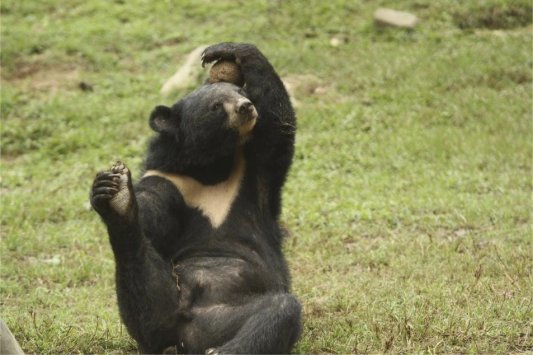
Yin Yang again, now throwing in some yoga poses too whilst continuing to rub the husk over his head – multi-talented! (photo: Animals Asia)
In December 2014 we made an additional donation of £250 to Animals Asia’s Vietnam sanctuary, currently home to 110 bears rescued from bear farms. With our donation, each bear was bought a coconut each as a special Christmas present since they loved the last ones so much. They were also bought 9 rubber tyres, one for each bear house, enrichment that provides hours of entertainment.
Our final distribution of funds for 2016 was one of our favourites – our annual Christmas present of a coconut for each bear in the Animals Asia Vietnam sanctuary. We have done this for a number of years now and it is such a delight to see the photos of the bears enjoying their gifts. The coconuts provide great enrichment for the bears and a super tasty treat to provide hours of entertainment.
In winter 2017 we again purchased a coconut each for all the Vietnam bears for their Christmas present. Following the wonderful news that the threatened eviction in 2012 was overturned, we at the Winton Bear Foundation decided to buy a coconut for each and every bear in the sanctuary as a special treat so that they could celebrate staying in their new home. We started this tradition in January 2013 and have been sending funds for this annual treat ever since.
Continuing our Christmas tradition, we made similar donations of £200 in both 2018 and 2019 to the Vietnam Sanctuary for them to buy a coconut for each of their bears as their Christmas presents from us.
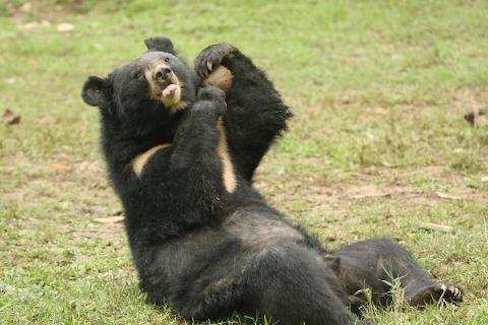
Mine, all mine – one of the bears enjoying their coconut.
Photo courtesy of Animals Asia.
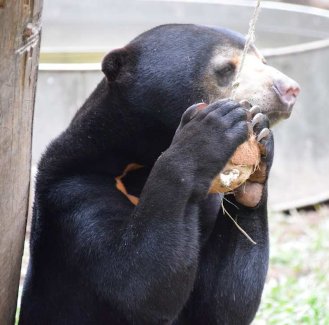
Goldie
Photo courtesy of Animals Asia - BEAR League
-
The BEAR League
In 2011 we made two donations to the work of The BEAR League in Lake Tahoe, California. The BEAR League work tirelessly to educate and encourage people to live in harmony with bears. Black Bears are naturally afraid of people but all too often wander into inhabited areas in search of food which very often gets them into trouble.
The BEAR League works to educate people on how to dispose of rubbish properly in bear-proof trash cans to help reduce ‘human/bear conflict’ situations and keep everyone safe.
We are making ongoing donations to the BEAR League and in June 2014 made another donation of £200.
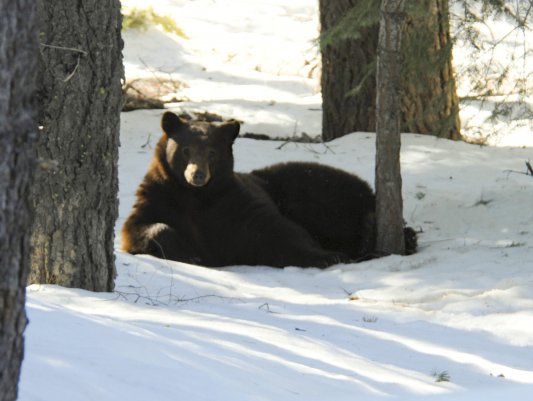
Martha relaxing in the snow. Photo courtesy of The BEAR League.
In April 2013 we sent £200 (approx US$300) to the BEAR League who work incredibly hard to keep their Lake Tahoe bears safe and to teach people how to live in harmony with bears. This donation was used to support the BEAR League’s Cub Rescue Program. The funds were used to purchase additional safe capture equipment and medicinal formulas for stabilizing emaciated and dehydrated cubs immediately after rescue. This is all very expensive and is always the difference between life and death when a cub is not found until almost the point of no return. Nothing matters but saving his or her life and it is vital that the team have everything on hand and ready to go or they risk losing a precious bear cub.
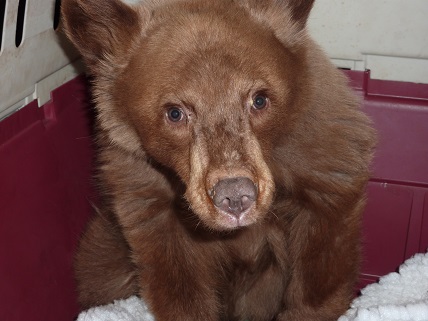
(photo courtesy of the BEAR League)
In 2005 we donated £300 to The BEAR League. The BEAR League, committed to keeping bears safe and wild in their natural habitat, do a lot of excellent work in Bear Awareness Education, both on-line and within the local community. They used our donation to purchase new capture equipment.
Ann Bryant (Executive Director) told us: “When we get calls on orphan bear cubs we must rescue them quickly and safely. For that we need various different types of capture equipment – nets, kennels, catch poles etc. (Unless they are still extremely small they don’t tend to willingly climb straight into our loving arms!). We are extremely grateful for all you do to help the bears, here at Tahoe and around the entire planet.”
As part of our Winter 2018 distribution we donated another £104 to the BEAR League. Their mission is to teach the public about the true gentle nature of the black bear. The black bear is quite docile, with a natural instinct to flee rather than fight. With teams of trained aversion specialists all around Lake Tahoe, the BEAR League works with local Law Enforcement, Animal Control and Fish and Game Officers to keep bears out of places they do not belong and educates them as to where they do belong. The BEAR League teaches humans how to live in harmony with bears.
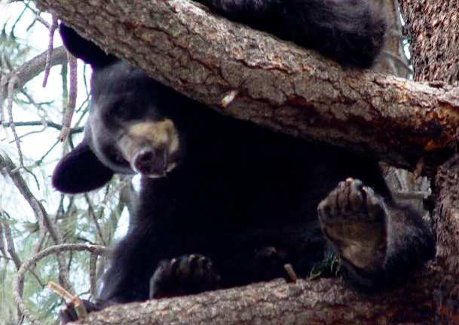
Photo courtesy of the BEAR League
- Bear With Us
-
Bear With Us
In December 2014 we donated £100 to a new beneficiary, Bear With Us, based in Canada. Bear with Us work to rescue and rehabilitate orphaned and injured bears and currently care for two rescued ex-circus bears Yogi and Molly. Bear with Us also work to promote human-bear coexistence.
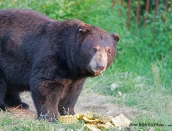
Yogi (© Bear With Us)
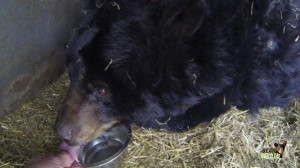
Molly (© Bear With Us)
- Bornean Sun Bear Conservation Centre
-
Bornean Sun Bear Conservation Centre
In December 2015 we donated funds to the Bornean Sun Bear Conservation Centre (BSBCC) based in Malaysia. Their mission is to promote sun bear conservation in Borneo through animal welfare, conservation, rehabilitation, education and research. They work to rescue sun bears and return them to the forest. There are currently 37 rescued bears living at the BSBCC – with a monthly food bill of US$3000! We made an initial donation of £300 towards these costs.
- Bubonitsky Orphan Bear Rescue Centre
-
Bubonitsky Orphan Bear Rescue Centre
In winter 2019 we made a donation of £200 to a new beneficiary, the Bubonitsky Orphan Bear Rescue Centre. The Pazhetnov family rescue and rehabilitate orphaned bear cubs from around Russia, with the goal of mimicking the bears’ natural upbringing in the wild as much as possible. The centre works with animals that must learn to survive in the wild. The base condition of this skill is a sense of fear of humans. If the animal is not afraid of people, it will not survive in the wild and is doomed to death or life imprisonment in a cage. They do not raise bears in any way – they provide them with conditions close to their natural habitat, and semi-freedom, thanks to which they form all the behaviours necessary for life in the wild: food, defensive, nesting, fear response to humans.
The centre can only rehabilitate orphaned bear cubs who were born in the current year and were not exposed to humans for lengthy periods of time. In exceptional cases, they can help orphaned bear cubs in the second year, if the situation is critical, e.g. in early spring when bears still hibernate in their dens and no food is available in the forest. Unfortunately they cannot rehabilitate and release older bear cubs that have either lived with people for some time or have been kept in captivity.
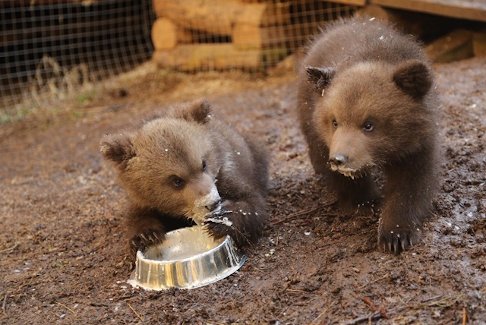
Photo from www.orphan-bear.org
- Chengdu Research Base of Giant Panda Breeding
-
Panda Conservation Education
The Winton Bear Foundation is working with Sarah M. Bexell PhD, the Director of Conservation Education at the Chengdu Research Base of Giant Panda Breeding. We funded the cost of around 2000 posters giving information on how best people can work to help save this beautiful bear and look after its natural surroundings.
The posters were distributed to schools in the area to help educate the next generation on how they can help ensure the survival of the Giant Panda. Through working with Sarah, we hoped to be able to reach around 400 schools and as each school has around 600 or more students per school that meant we could help play a part in educating around a quarter of a million children about the threats facing the Giant Panda.
- Cochrane Polar Bear Habitat
-
Cochrane Polar Bear Habitat
In winter 2019 we made a donation of £211 to a new beneficiary. the Cochrane Polar Bear Habitat. The Cochrane Habitat was founded as an orphanage for polar bear cubs rescued from the wild, and opened in 2004. Cochrane focuses exclusively on polar bears and has expert staff and state of the art facilities. It takes in bears which cannot return to the wild, typically from zoos retiring “their” bears to a more natural environment. It does not breed bears.
The Polar Bear Habitat also takes part in vital research in partnership with Canadian and international universities and scientific organizations. These studies may be published as peer-reviewed journal articles or they may aid in the development of new research tools and techniques. Every research project that is proposed must be approved by the PBH Animal Care Committee (to ensure that the proposed methods are in accordance with PBH care standards). Once approved, animal care staff will begin data and/or sample collection, which can range in duration anywhere from 28 days to four years. The Habitat has a total area of 110,000 square metres (27 acres) on a site of 70 acres of sub-arctic boreal forest. The five enclosures cover a total area of 97,853 square metres (24.2 acres). This makes it the largest facility in the world dedicated to polar bears. Each of the enclosures has a live camera, which you can access on the website.
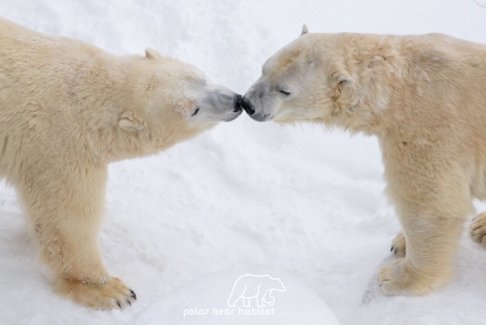
Photo from Cochrane Polar Bear Habitat
- Eco-Halych
-
Eco-Halych
For a while now we have been looking for projects to support in Eastern Europe where many bears are still suffering, so we sent a donation of US$250 to The Eco-Halych Wildlife Rehab based in the Ukraine. The NGO Eco-Halych assists the development of Wildlife Rehab of the Halych National Park in the west of Ukraine. Handicapped animals like foxes, wolves, raccoon dogs, ferrets and others which cannot be returned to the wild can find a permanent home here, with professional care, adequate diets and enough space to satisfy their needs. We are supporting their efforts to build a natural bear habitat for mistreated and abused bears and our donation will be used to fund wooden enrichment for their rescued bears.
The Winton Foundation for the Welfare of Bears donated a further sum of £497 in the winter of 2017 to help purchase a camera for live streaming of the bears. There is still a problem in the Ukraine, with over 200 bears known to be kept in appalling conditions such as rusty cages and barren concrete pits, without proper food or care. A lucky few bears are enjoying life again at Eco-Halych.
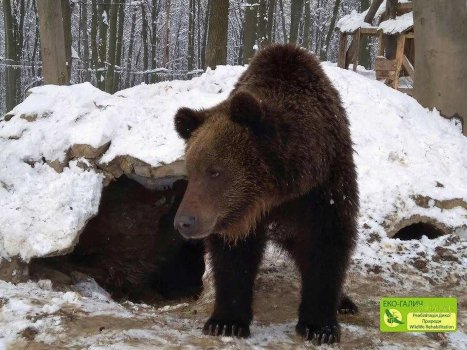
Myr, one of the bears at Eco-Halych.
Photo courtesy of Eco-Halych.
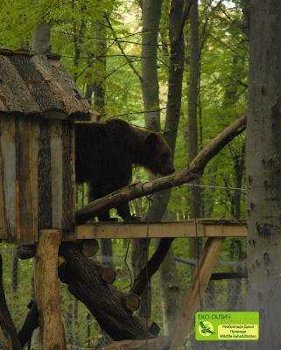
Myr investigating the treehouse at Eco-Halych.
Photo courtesy of Eco-Halych. - Five Sisters Zoo
-
Five Sisters Zoo, Bear Sanctuary
The Winton Bear Foundation are working with Five Sisters Zoo in West Calder in Scotland following their rescue of three ex circus bears, Carmen, Suzy and Peggy. The highly dedicated staff at the zoo have worked tirelessly to rescue and rehome these bears who would otherwise have been destroyed. We are happy to say we are working together with them to produce educational materials and raise awareness of the appalling abuse bears exploited for ‘entertainment’ endure. Our first joint leaflet was produced in March 2012 and it’s been heartening to listen to the children talk about how bad it is that the bears were subjected to such suffering.
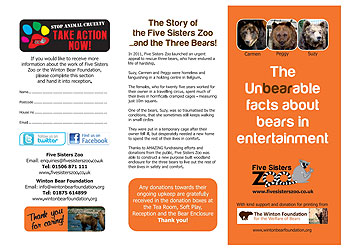
Bears exploited for ‘Entertainment’
In May 2012 we bought a special dedication plaque in the name of the Winton Bear Foundation to go on one of the posts around Carmen, Suzy and Peggy’s sanctuary. Funds raised from the plaques go to the care and upkeep of the three rescued circus bears. We hope that this will help raise the Foundation’s profile and also help with the bears’ rehabilitation. We hope you like the wording.
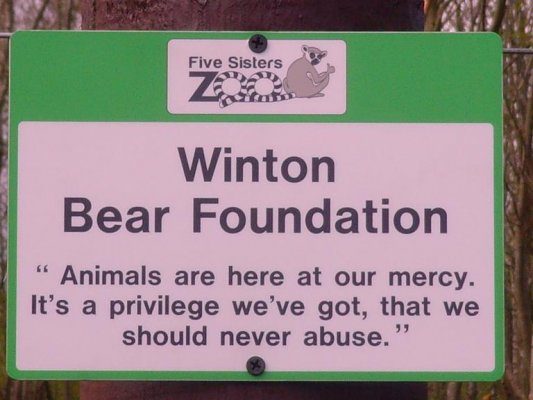
Winton Bear Foundation Plaque
Continued support for Carmen, Suzy and Peggy
Following the devastating fire that broke out at the Five Sisters Zoo on April 14th 2013, which caused many animals to perish, we at the Winton Bear Foundation wanted to do our bit to help this wonderful little family zoo to get back on its feet.
The Five Sisters Zoo rescued three ex-circus bears Carmen, Suzy and Peggy in 2012 and have given them an incredible home and have lovingly nursed them back to health. Therefore, to help ease the financial strain a little during this difficult time and to continue our support of their bear sanctuary, we donated £500 to cover the cost of some of the bears’ food requirements.
We pledge our support for their bears, for as long as it is required.
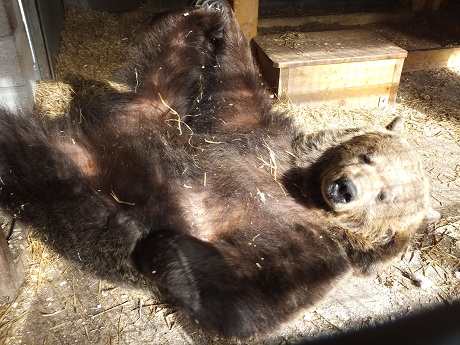
Suzy
(photo courtesy of Five Sisters Zoo)In May 2013 we donated £50 to the Five Sisters Zoo to pay for approximately two months of glucosamine tablets. The tablets help with any joint problems and arthritis the ladies may be feeling as a result of their advancing years and their decades of having to perform. We hope this will help ease any discomfort they may be feeling. The picture below was taken just as Carmen was returning from a run around her enclosure – clearly the tablets are working!
Honey
A big thank you to Littleover Apiaries for their ongoing support, providing supplies of honey for Carmen, Suzy and Peggy at the Five Sisters Zoo in Scotland. Thank you for this lovely big box of honeycomb which we presented to Head Keeper Lynn. As the bears are still enjoying their winter snooze, Lynn will keep the honeycomb safe until the bears get up for breakfast. Thank you Littleover Apiaries from all of us.
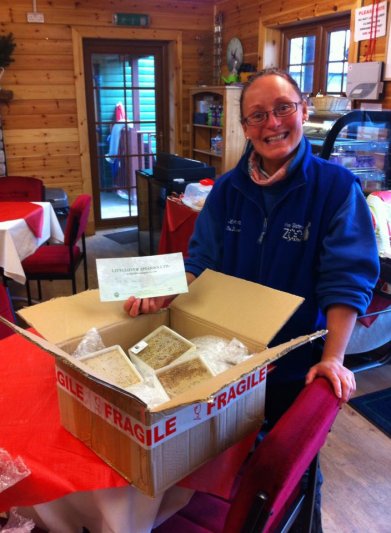
In December 2015 we donated £300 to the Five Sisters Zoo based in West Calder, West Lothian. Since the zoo rescued three female bears Carmen, Suzy and Peggy from life in a travelling circus we have helped fund medicine, food and enrichment for the bears. Carmen, Suzy and Peggy spent over 25 years as part of the circus, spending much of their lives in horrifically cramped cages measuring just 10m square before they were rescued from this miserable life and brought to a safe, happy and loving new home. The zoo has also been great supporters of our Humane Education project Fostering Compassion for children in foster care and kinship care, welcoming the children to meet the bears. Through learning about the bears’ stories, the children gain a greater understanding of their own circumstances and the bears are a great hit with the children.
We were so pleased to be able to help again with the care of the bears. Our donation funded replacement boomer balls, glucosamine and special buckets to store their food in daily over the winter just in case the bears get up for a snack.
Carmen, Suzy and Peggy – ‘Vegging Out’ food fund appeal
In addition to the above support, we decided to set up a special ‘food fund’ for Carmen, Suzy and Peggy, primarily to help pay for the cost of their fruit and veg shopping bill over the summer months, but also to help with the cost of their glucosamine tablets to help ease any arthritis in the elderly ladies’ joints and to help keep them as comfortable as possible. The poster below has all the details about this special appeal including how you can donate. Please give generously.
Thanks to the generosity of Winton Bear Foundation supporters, we were able to take through the first batch of fruit and veg. The bears had put in a special request for melons, so their wish was our command!
- Forest Animal Rescue
-
Forest Animal Rescue
In July 2013 we made our first donation to a brand new beneficiary – Forest Animal Rescue, formerly known as Peace River Refuge. Based in Florida, US, they provide lifetime care for non-releasable wild animals. We made an initial donation of US$200 to be used to buy food and enrichment toys for their bears and some upgrades to their pool.
At the beginning of 2017 we received an emergency appeal for help from our friends at Forest Animal Rescue to help buy some toys and enrichment for their new bears. We were delighted to help and donated US$220 to buy a jumbo boomer ball that went down a treat!
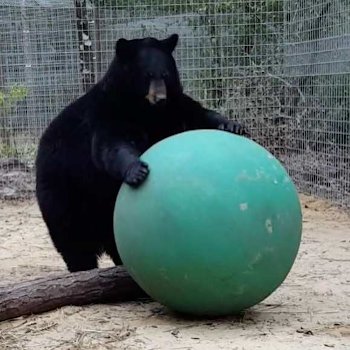
Photo courtesy of Forest Animal Rescue
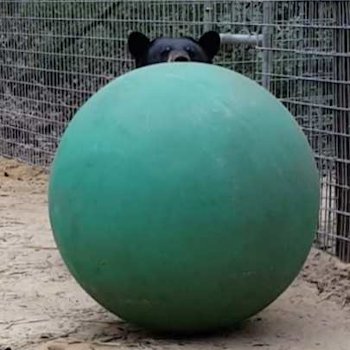
Photo courtesy of Forest Animal Rescue
- Forgotten Animals
-
Forgotten Animals
Founded in 2011, Forgotten Animals became the first international organisation to work in towns and regions of Russia. Unlike in the main cities Moscow and Saint Petersburg, the animal welfare community there was virtually non-existent. Instead of merely fighting the consequences, the approach is to target the root causes of the problems, whilst using Western animal welfare expertise and knowledge and understanding of local culture and mentality. Since then Forgotten Animals, a registered charity in both UK and Russia, has carried out or directly supported projects in 60 cities across 5 countries, and counting. Today, Forgotten Animals closely collaborates with a number of animal welfare organisations around the world in order to bring positive change, one animal at a time.
Anna Kogan, Founder and CEO says: “I believe we can achieve major shifts in behaviour and attitude towards animals. We are doing it where the most difference in animal welfare can and needs to be made. In partnership with UTYOS we are building a Bear Cub Rehabilitation and Reintroduction Programme to rescue, rehabilitate and release orphaned bear cubs back where they belong. After 15-18 months these bears are strong enough to be released back into the wild. We helped build a new natural enclosure and other facilities equipped with everything needed to monitor the well-being of cubs during their rehabilitation period. Despite being such a unique centre, located in the best possible area for the crucial conservation work they do, UTYOS doesn’t receive any funding from the Government.”
In 2018, with the financial support of the Brigitte Bardot Foundation, three orphan male Himalayan cubs and one brown bear cub rescued in 2017 finished their rehabilitation and were released back into the wild by Utyos Wildlife Rehabilitation Centre, run by Eduard Kruglov in the remote forest of the Russian Far East. They will now contribute towards conservation of these iconic Russian species. We have stipulated that our donation should go to their Bear Rehabilitation Project.
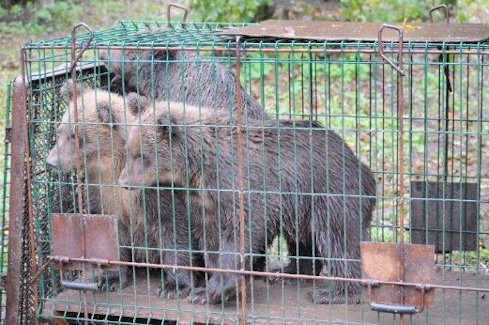
Photo: forgottenanimals.org
In summer 2020 Another urgent appeal came in from the UTYOS Bear Cub Rehabilitation Project via Forgotten Animals to which we donated £200. Each year, 3,000 to 4,000 bear cubs are left to die after their mothers are killed during the bear hunting season in Russia, but this little cub had had a different fate. In remote Russia her momma and two siblings were killed by a train and she was left alive, fighting for her life. The little cub was treated at the UTYOS Bear Cub Rehabilitation Project. Very sadly we received an update that the little cub succumbed to her injuries. Despite the tireless efforts of the amazing UTYOS team to save the little one’s life, her trauma was so severe that nature took its course, putting her out of her misery. She had internal bleeding in her brain caused by severe trauma and her other internal organs were badly damaged from the injuries she sustained. We can try to find comfort in the fact that she was loved and cared for during her last days, was not in any pain and went peacefully without suffering. The remaining funds were used to care for other current residents of the Centre, like these three cubs who arrived at the centre in May.
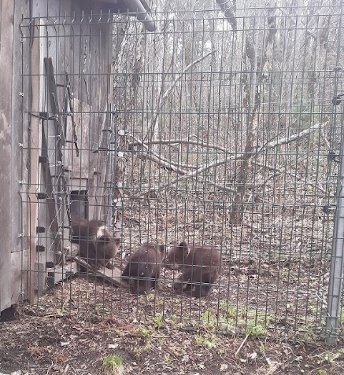
Photo credit – forgottenanimals.org
- Free the Bears
-
Free the Bears
In July 2015 we donated £200 to a brand-new beneficiary of the Winton Bear Foundation – Free the Bears. Based in Perth, Western Australia, Free the Bears is dedicated to protecting, preserving and enriching the lives of bears around the world. They currently work in six countries throughout Asia where bears are illegally captured to be butchered for their body parts, turned into medicine or bear paw soup, or incarcerated in bile farms. Free the Bears employ a range of strategies including environmental education, conservation research and strengthened law enforcement to ensure that they achieve their mission to protect, preserve and enrich the lives of bears throughout the world. We are proud to make them a beneficiary of WBF and look forward to supporting them on an ongoing basis.
- Get Bear Smart Society
-
Get Bear Smart Society
The Winton Foundation for the Welfare of Bears is proud to announce that we are now supporting the wonderful work of the Get Bear Smart Society in Whistler, Canada. This amazing organisation works tirelessly to promote harmonious living between bears and humans. Sadly, many problems arise when there is not enough food in the wild for the bears to eat and they wander into towns, following their noses, in search of food. This often results in bears being shot or being involved in motor vehicle accidents.
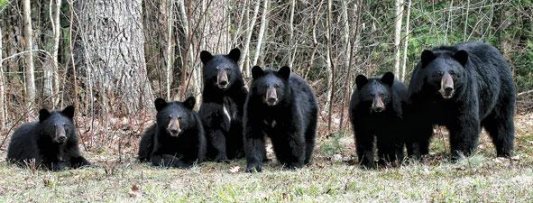
Some of Whistler’s Black Bears, photo courtesy of Get Bear Smart
In January 2012 we donated £100 towards GBS’s spring planting project. Our contribution bought around 12-15 berry trees to be planted in the wild to help ensure enough food for the bears and prevent them wandering into towns and subsequently into danger. I hope you will agree that this is a wonderful project for WBF to support, and we are looking forward to continuing to back this wonderful organisation’s work.
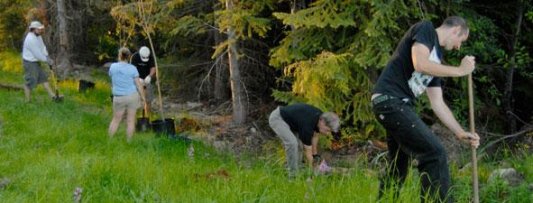
Planting berry trees, photo courtesy of Get Bear Smart
In January 2013 we donated another £100 (CAN$160) to help the Get Bear Smart Society continue their work to enhance bear habitat. The funds were used to plant more berry trees in the wild to give the bears an adequate food supply to help deter them from wandering into residential areas which of course immediately puts them at risk. We are delighted to help support GBS’s habitat enrichment programme to help protect their bears.
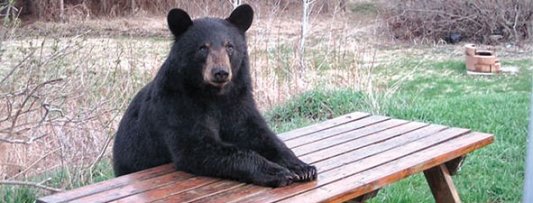
Grubs Up!
(photo courtesy of www.bearsmart.com)One of Get Bear Smart’s goals is to minimize the number of bears killed as a result of human-caused problems and to prevent conflict by encouraging police and bear managers to choose non-lethal bear management practices. Bears are often attracted to urban areas by human food sources and once a bear becomes comfortable accessing these foods, they sometimes follow their nose and enter people’s homes in search of more food. This is without a doubt the point at which even the biggest bear lover says NO.
One passive deterrent device is an Electric Unwelcome Mat that can be placed in front of doors and windows to discourage bears. The mats automatically provide negative feedback to bears if they attempt to access the property. They are not harmful to bears or any other animals. One mat costs US$800 so we donated US$400 towards the cost, the purchased mat purchased to be loaned out to residents who have experiences of bears peeping in their windows and doors. The mats are the most effective deterrents on the market. Sylvia Dolson of Get Bear Smart says “We’ve had so many instances where we could have used one and saved a bear’s life.”
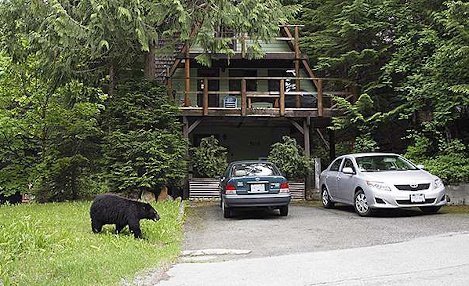
Photo courtesy of Get Bear Smart

Evelyn Kirkaldy: www.bearsmart.com
- Hauser Bears
-
Marko and Maria
In August 2011 The Winton Bear Foundation worked to help Hauser Bears care for two Brown Bears called Marko and Maria, brother and sister. Since they were tiny cubs, Marko and Maria had been held captive in appalling conditions in a small cage outside a restaurant in Tirana. Arrangements were made to move them to the Libearty Bear Sanctuary in Romania, and we assisted with the day-to-day costs of providing them with a good diet and care while they awaited their journey to the sanctuary.
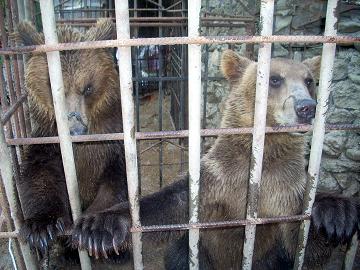
Marko and Maria before rescue
- Idaho Black Bear Rehabilitation Centre
-
Idaho Black Bear Rehabilitation Centre
The Winton Bear Foundation is a staunch supporter of the incredible work of Sally Maughan at the Idaho Black Bear Rehabilitation Centre. IBBR rescues and cares for cubs orphaned after their mothers have been shot by hunters. If the cubs were left in the wild, they would die from lingering starvation. The lucky ones are brought to IBBR where they are nurtured and lovingly cared for until they are big enough and strong enough to be returned to the wild for a second chance at life.
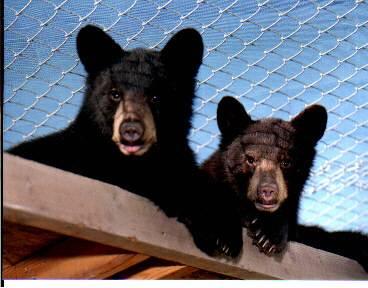
Two of IBBR’s cheeky residents! Photo courtesy of IBBR.
In January 2012 The Winton Bear Foundation donated US$500 to the Idaho Black Bear Rehabilitation Centre. We are delighted to report that the funds were used towards the cost of repairing and replacing nine out of their twelve dens after a very rowdy bunch of eight Washington bear cubs destroyed all but two of them before their release in June 2011. Let’s hope the next residents at IBBR were more appreciative of their surroundings!
We are making ongoing donations to IBBR and in June 2014 donated £100 (US$170)
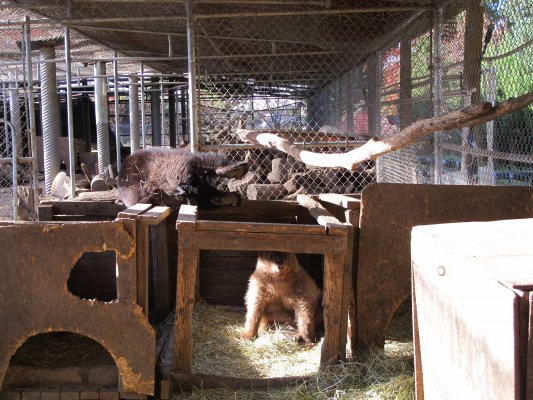
Picture of dens needing rebuilt, photo courtesy of IBBR
The above photo clearly shows how well the Washington cubs did with their ‘Demolition Derby!’ Mind you, it looks like one of the current residents is having a good go at finishing them off!
In May 2012 The Winton Bear Foundation donated £100 (USD160) to the Idaho Black Bear Rehabilitation Centre and took great delight in the fact that the funds went towards a new swimming pool for the cubs to enjoy. The story to raise these funds and give the cubs a pool was an inspiring one…
Each year IBBR face repairs from mischievous bears, but with the swim tub they face problems with both the drain holes in the tub and drain pipes freezing.
This year, a leak froze the drain holes in the tub and the whole drain system. Consequently, IBBR was facing a major repair and rebuild. The swim tub became completely unusable and the bears, out of their winter hibernation, were checking it constantly for water. There was a small tub of water for them, but that was only for drinking.
Sally Maughan, founder of IBBR, said “To see them without the swim/water tub would break my heart and be so sad for the bears. The swim/water tub is their number one source of joy and fun for them”.
Therefore, the IBBR Facebook admin team decided that it was time to try and raise some funds specifically for a new swim tub for the cubs. On 24 March 2012, the admin team had arranged for an all day online Swimming Pool FUN(d)raising party where friends and supporters from all over the world participated in this exciting event, which included games, banter, bear jokes, bear stories, bear photos and videos – all in all, a lot of fun and a lot of prizes to be won that friends and supporters had donated in advance!
The goal was US$3000 (the estimated price of a new swim tub) which was nearly met due to the extremely generous help of IBBR’s supporters who managed to raise US$2846.35 – when we heard this at The Winton Bear Foundation, we quickly decided that we would make up the shortfall to take it up to US$3000; hence the US$160 donation. We were delighted to be part of this incredible fundraising effort by IBBR and its supporters. Happy swimming cubs!
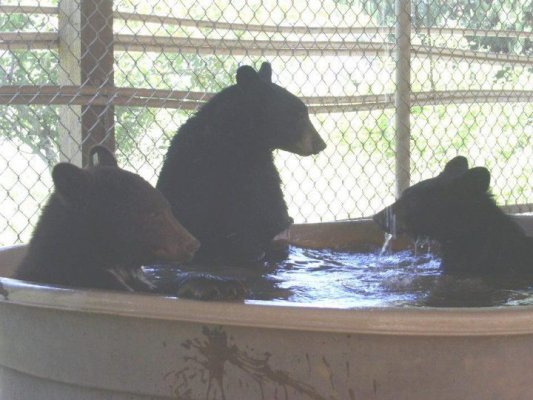
Three cubs at IBBR enjoying a break in the swim tub.
Photo © IBBR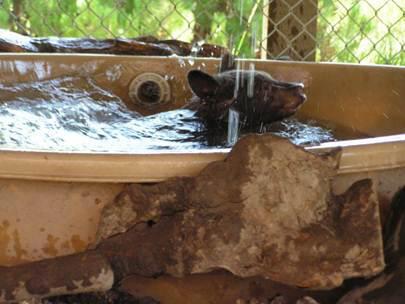
Life is good!
Photo © IBBRHaving cared for more than 200 orphaned and injured bears over 24 years, Sally Maughan at the Idaho Black Bear Rehabilitation Centre devotes her life to caring for her bears and always puts them first, regularly going without sleep and working round the clock. In February 2013, for the first time ever, Sally was brought a 7 year old Momma bear and her cub. The Momma bear had been shot in the front leg and was about 80lbs underweight and with a cub, she deserved a second chance. Sally says “Never in this lifetime or another one would I have thought that the opportunity to care for a mother and cub would come to pass. The opportunity for learning is priceless. We are so excited about all the behaviour and information we will have the chance to observe between mom and cub while they are here. Both are beautiful – the cub has a white diamond shape on his chest. Mom’s wound has been treated and for now she is resting, eating and gaining strength.” We will be following Sally’s amazing work caring for bear, mom and cub and getting them well enough for their eventual return to the wild together. We made an initial donation of £100 (US$160) towards the cost of caring for this special duo.
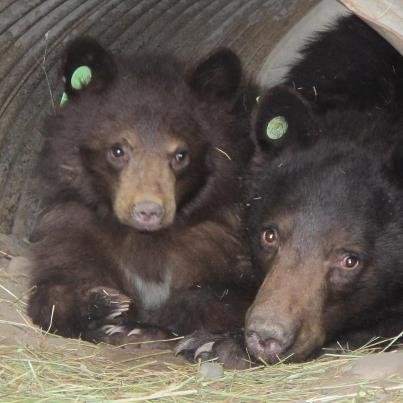
(photo courtesy of IBBR)
In November 2017 we issued a further £400 to The Idaho Black Bear Rehabilitation Center to aid the ongoing care of rescued cubs and the release of their current residents America and Liberty in the spring. As a wildlife rehabilitator since 1978, founder Sally Maughan started The Idaho Black Bear Rehab program in 1989 with the arrival of the first orphaned black bear cub. She began developing rehab techniques for orphaned cubs at a time when it was believed impossible to successfully release any bear raised by a human. Prior to that, the only rehab available to orphaned cubs was the occasional bear biologist. Wildlife agencies believed that an orphaned cub raised by a human would either starve to death or become a problem bear if released. IBBR cover all the rehab expenses for each bear, and require that each bear return to its home state for release.
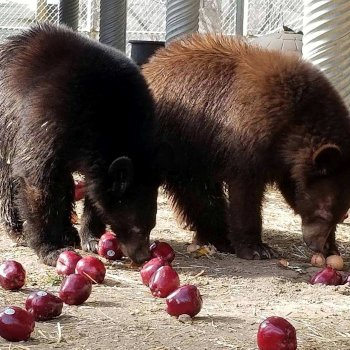
Photo courtesy of Idaho Black Bear Rehab (IBBR)
In November 2017 we also made a grant of £400 to Valerie Stephan-LeBoeuf to help with a collaborative environmental education and outreach effort between The Animals Trust and Idaho Black Bear Rehab. “Walking with Wildlife” will bring environmental education into public schools throughout the state of Idaho with the goal to engage, inspire and empower students as they become leaders in their community in order to reduce human/wildlife conflict and to protect natural environmental systems. Human/wildlife conflict is a growing concern in communities throughout the state of Idaho. The project will carry a strong focus on the resolution of human/bear conflict.

Photo courtesy of Valerie Stephan-LeBoeuf
In winter 2019 we made another payment of £209 to IBBR to help cover the transportation, vet bills and food expenses of the bears. They had recently taken in three cubs, two male and one female. One of the males started having seizures when the IBBR team arrived to collect him, possibly due to overmedication when he was immobilised – each animal can react differently to these medications. A vet was quickly called in and he was treated, with no further adverse effects.
The second male was a big healthy cub, but had no mother. Sadly the female cub was in rough shape. Despite the best efforts of the vets and the IBBR team she passed away. Sally Maughan said: “It is so hard to face this challenge in rehab. We hope, we pray, we worry, we see improvement and then we see them going downhill. Sometimes the decision isn’t up to us. We do all we can, the vet does all he can, WA did all they can and Maple made the decision. I’m glad she spent time with Amy in the end as I’m sure that was a comfort to her and maybe her way of acknowledging how hard everyone tried. Her sweet body just couldn’t overcome it all.”
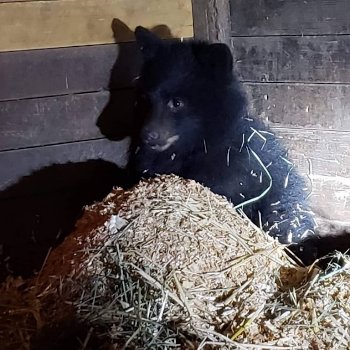
Photo – IBBR
In April 2020 we heard from our regular beneficiary IBBR that they were badly in need of funds to help in the summer release of their rehabbed bears. Three out of five of these bears, Hucklebeary, Finn and Monte, were all released in early May. The rehabbed bears are released as close to their original territory as is safe. Once free they overcome any confusion when they realise how far they can run and that they can eat what they like. An expensive item that the Idaho Black Bear rehab needed for their summer releases was a dart gun and immobilisation drugs. We were happy to make a substantial contribution of £331 to the cost of this equipment.
Following the release of these lucky bears, Idaho Black Bear Rehabilitation Center received three new cubs from Nevada – two siblings (one male, one female) and another unrelated male. So, we said happy goodbyes to the bears who have new found freedom and welcomed Ninzi, the sister bear, Lou the brother bear, and Hazelnut (because that second male is a nut and they are going to have an exasperatingly good time watching the trouble he gets into).
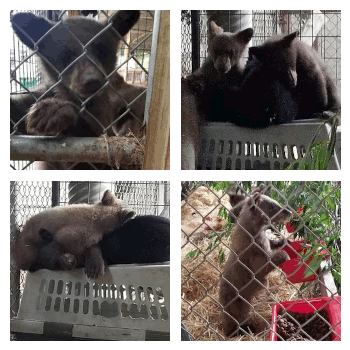
Photo credit – bearrehab.org

- In the Company of Wolves
-
In the Company of Wolves
In the summer of 2018 we became aware of the story of Sammy – a resident at In The Company Of Wolves based in Hesperia, CA, USA. Sammy was originally known as Azuza before she arrived at ITCOW. The little cub was found all alone and very underweight by a hiker (she was only around 5 lbs at the time). She basically just went right up to him and into his arms, so we are told. One of her ears was partially missing and it was thought she could have been hit by a car that killed her mother and swiped her as well leaving her, a wee little cub, all alone and defenceless in this big world.
Little Azuza was taken to a local wildlife rehab center initially and then transferred to Lake Tahoe Wildlife Center. After visits with the vet and careful observation, they knew she had some head trauma and was sight impaired too. She became a “special needs” cub and due to her permanent impairments would not be able to survive on her own and therefore could not be returned to the wild. She was eventually transferred to ITCOW who had an unoccupied enclosure that was designed especially for a black bear. Little Azuza, now recognised as non-releasable, was welcomed into their sanctuary. Touched by Sammy’s story, we sent £122 to buy Sammy her favourite hard ball toys and her special treats of peanut butter and oranges.
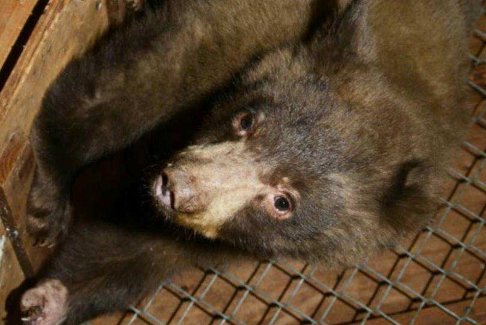
Sammy (photo courtesy of In the Company of Wolves)
In winter 2019, we learned that Sammy, now 3 years old, had a new companion, Woody. He had been taken into rehab in August after being found orphaned and underweight. Woody had become habituated to humans and had severe injuries to his left rear leg, possibly caused by gunshot and/or a bite crush wound caused by an older male bear. Vets concluded that his leg could not be saved and his habituation made him unreleasable, so he found his new forever home with ITCOW. Woody and Sammy become friends immediately and now share an enclosure. Woody loves most all foods but he absolutely loves grapes, so we sent a little something in our winter distribution to keep the two of them well stocked with their favourite things!
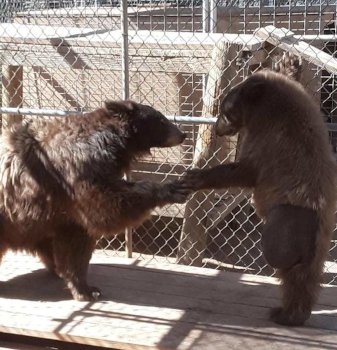
Woody and Sammy – “Friends for life”
(photo from In The Company Of Wolves) - International Animal Rescue
-
International Animal Rescue
In February 2011 we assisted International Animal Rescue’s work to carry out operations on their rescued blind ex-dancing bears who had lost their sight due to this miserable practice. We provided £200 towards the cost of an Autoclave, a vital piece of equipment required to perform the operations safely. Bears used as dancing bears often go blind from malnutrition or from being beaten. Restoring or partially restoring a blind bear’s sight helps them feel safe and secure again, and enables them to mix with their sighted bear buddies at the sanctuary.
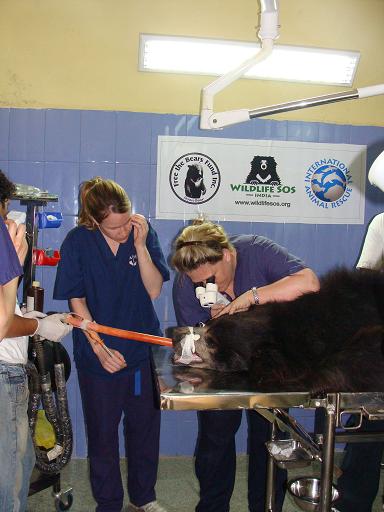
The operations to restore the blind bears’ sight
- KWPLH
-
KWPLH
We are supporting the work of KWPLH, based in Indonesia, whose Sun Bear enclosure is currently home to five Sun Bears who were rescued after being taken from the wild and kept illegally as pets. KWPLH aims to instil a more positive attitude toward Sun Bears and their conservation, ultimately reduce the trade in wildlife, and create support for forest conservation activities.
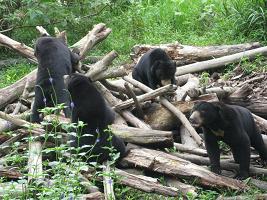
The sun is shining on KWPLH’s bears!
Photo courtesy of KWPLH.Their stimulating enclosure promotes natural behaviour, which is highly beneficial for the health and welfare of the bears. The current residents are Bennie, Idot, Harris, Batik and Anna. Anna often bosses Harris and Bennie around, but Idot pushes her around!
- Libearty
-
Libearty Bear Sanctuary, Romania
We made a donation to the Libearty Bear Sanctuary in Romania in December 2014. We have already adopted their big bear Max but decided to make an additional donation of £100 towards the cost of their building a special enclosure for one of their blind bears who has been rescued from a zoo where he lived in very bad conditions. He was given his own special enclosure to allow for his disabilities, with his own swimming pool, den and an area with grass and trees.
- Lions, Tigers and Bears
-
Lions, Tigers and Bears
In June 2014 the Winton Bear Foundation selected a new beneficiary to support. For the first time we sent a donation of £100 (US$170) to Lions, Tigers and Bears based in Alpine, California in the United States. Lions, Tigers and Bears currently cares for four bears – Liberty, Delilah, Blossom and Sugar Bear – in their wonderful four acre ‘Black Bear Habitat’ which provides a more natural environment for its four furry occupants. We are delighted to support them for the first time and look forward to giving them ongoing support.
The Lions, Tigers & Bears rescue team travels tens of thousands of miles to save abused, neglected and abandoned exotic animals from around the country. They not only help save animals bound for their sanctuary, but also provide critical rescue, medical care and safe transport for hundreds of big cats, bears and other four-legged animals to new forever homes at reputable sanctuaries across the United States. Animals rescued by LT&B have been through unimaginable hardships, often left in small cages without proper nutrition or fresh air, and have travelled thousands of miles for a second chance. There are currently 10 bears in their sanctuary – 6 black, 2 grizzlies and 2 Himalayan black bears – and our winter 2018 donation of £212 went towards buying them their favourite nuts, dates and food and any enrichment items they felt the bears would like.
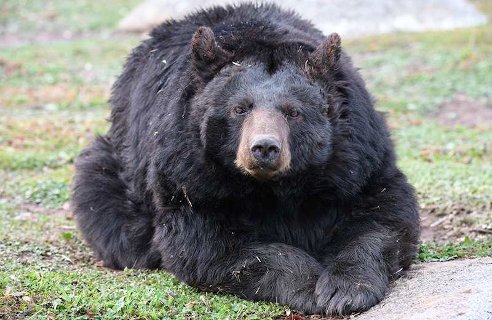
Photo courtesy of Lions, Tigers and Bears
- MongoliAid
-
MongoliAid
The Gobi bear is the rarest bear in the world today. In 2013, there were only 22 left in the wild. There are no Gobi bears in captivity. They have found a way to live in one of the most extreme environments on the planet – the only bear of any kind that dwells exclusively in desert habitat. Just a few years ago estimates put the number of Gobi Bears at as many as 50; the recent figure of 22 survivors comes from a population survey just completed by the Mongolian government and wildlife experts.
We are delighted to announce that MongoliAid International has become another new beneficiary. MongoliAid International is a small charity founded in 2009 and is funding the 2016 Gobi bear supplemental food distribution programme in conjunction with the MAMA NGO, the Gobi Bear Research Project and the GGSPA Park Administration.
Each eight days of food drops cost US$2425, which includes the hire of two trucks for approx eight days, 1000L of fuel, the hire of helpers, food and a satellite phone hire. The Winton Bear Foundation provided funding for one of these eight days.
In 2017 we once again supported MongoliAid with a contribution towards the cost of the summer food drop. We provided them with funds to cover the cost of one of the eight days of food drops.
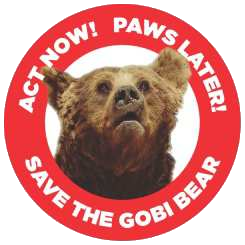
Photo courtesy of MongoliAid International
Once again, in the summer of 2018, we helped MongoliAid International by providing £274 for the provision of supplemental feed drops to the very rare Gobi Bear. The Gobi bear is the rarest bear in the world today. In 2013, there were only 22 left in the wild and there are no Gobi bears in captivity. Scientists continue to study the shy and elusive bears whenever they can. Some have been briefly captured and fitted with GPS radio collars, which has helped to map the animals’ habitat use. As part of our summer 2018 distribution of funds, we helped MongoliAid International to fund the provision of supplemental feed drops to the Gobi Bear for that summer.
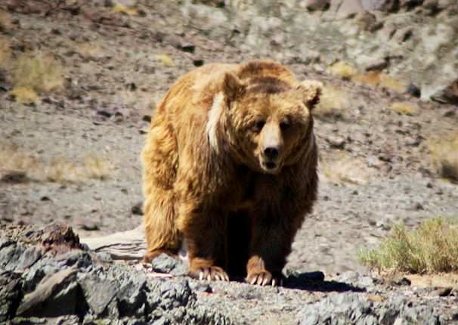
Photo: 2017, USN – Institutt for natur, helse og miljø, Bø
- Northern Lights Wildlife Shelter
-
Northern Lights Wildlife Shelter
The Northern Lights Wildlife Shelter, based in Smithers, BC, Canada, works to give a second chance to wildlife in need and since its opening in 1990 has helped 236 bears, including 3 Kermode Bears and 9 Grizzly Bears. It is the only government permitted organisation allowed to work on grizzly cub rehabilitation. Like IBBR in the US, NLWS works to help young bears in need and care for them until they can be returned to the wild.
The Winton Bear Foundation helped fund NLWS’s rehabilitation success studies and their Black Bear release project in 2012, with the aim of releasing around 5 bears (including the two lads below!) with radio collars to allow them to be monitored via GPS. This is a vital aspect of rehabilitation work to show that rehabbed bears adapt well to the wild once they have been returned. We were delighted to supported it.
We are making ongoing donations to NLWS and in December 2013 donated £100 and in June 2014 £100.
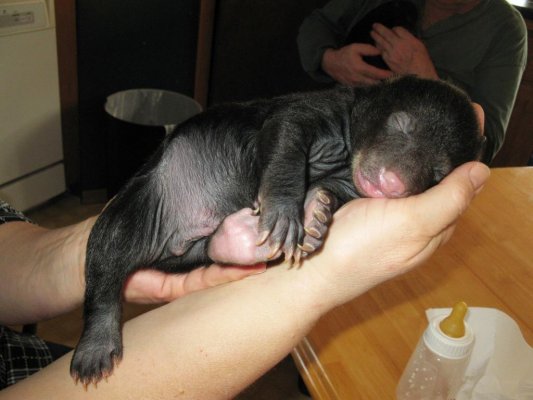
Yogi having a snooze.
Photo courtesy of NLWS.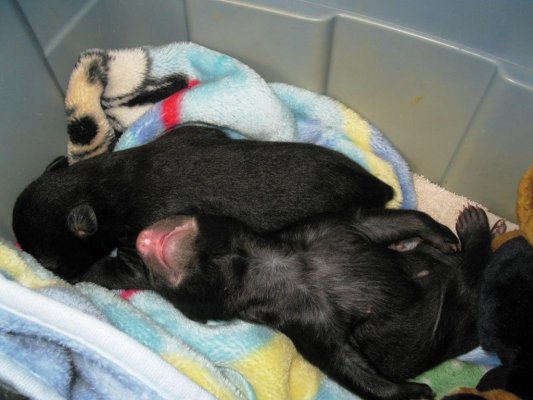
Yogi and his buddy having an after-meal snooze.
Photo courtesy of NLWS.In December 2015 we were really excited to be able to send the Northern Lights Wildlife Society £300, sufficient funds to help with the cost of materials for the construction of a climbing platform and hammock – some fabulous enrichment for the grizzlies to enjoy.
In June 2016 we answered an appeal by our friends at Northern Lights Wildlife Shelter for donations to help feed a “full house” of cubs. The shelter picked up a trio of orphaned cubs, adding to the 13 already in the shelter’s care. At CAN$50 a week per bear for milk formula, their bills were soaring! We sent CAN$300 to help feed the triplets for two weeks.
The cubs had been spotted near Chapman Lake, wandering for several days, with no mother in sight. Angelika and Peter Langen from NLWS managed to rescue all three and keep the siblings together. They will be in their care for a good few months yet, so we were glad to help with the milk costs.
In summer 2019 we made a donation of £201 to NLWS towards the purchase of a low-impact tranquilizer gun. The Northern Lights Wildlife Society rescues starving and distressed orphaned bear cubs, raises them until they can survive on their own, and then releases them back into the wild. The Langens of northern British Columbia run one of the busiest bear rehabilitation centres and are the only people in the world licensed to raise and release grizzlies. Here, bears get a second chance at life in the wild. The guns the Conservation Officers use are meant for adult bears and they recently lost 2 cubs due to dart impact. By buying a low-impact gun they will be able to tranquilize much more safely.
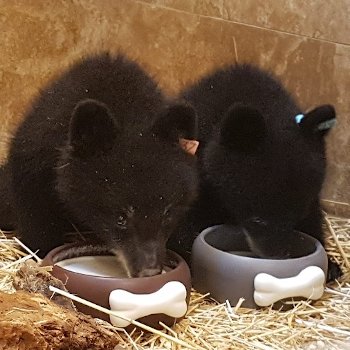
Photos: www.facebook.com/NLWSCanada/
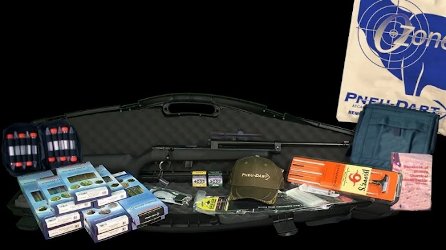
Low-impact tranquilizer gun
- Polar Bears International
-
Polar Bears International
We are supporting the work of Polar Bears International, based in the United States and dedicated to the worldwide conservation of the Polar Bear and its habitat through research, stewardship, and education. Polar Bear International provides scientific resources and information on Polar Bears and their habitat to institutions and the general public worldwide.
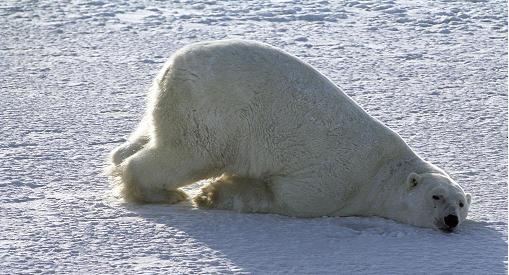
Bottoms Up! Photo courtesy of Robert & Carolyn Buchanan/PolarBearsInternational.org
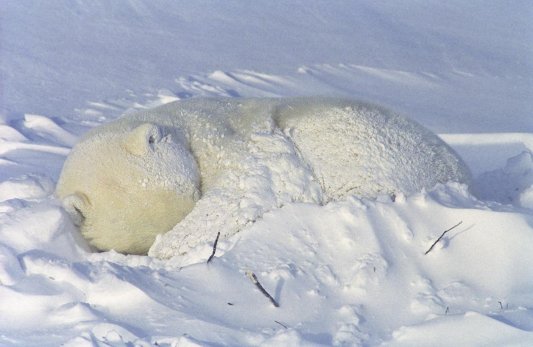
Sleepy Head. Photo courtesy of Robert & Carolyn Buchanan/PolarBearsInternational.org
- Southwest Wildlife Conservation Center
-
Southwest Wildlife Conservation Center
During the summer of 2018 our Founder and CEO Lesley Winton visited the Southwest Wildlife Conservation Center based in Arizona, USA. The centre rescues and rehabilitates wildlife that has been injured, displaced and orphaned, and once rehabilitated they are returned to the wild. In May 2018 they had five black bears in their care – these are permanent residents that are non-rehabitable. Given the scorching hot Arizona summers, we decided to send £65 to buy them all their favourite watermelons to keep them cool. The bears are called Tahoe, Griz, Igasho, Cinnamon and Heavenly. We are delighted to support SWCC and even happier to provide these gorgeous bears with their favourite watermelons! You can read all about them in Issue number 16 of our newsletter.
In summer 2019 we sent an additional £101 to the Southwest Wildlife Conservation Center to buy their bears their favourite watermelons to help keep them cool in the Arizona summer. We followed this up with a similar donation of £106 in summer 2020.
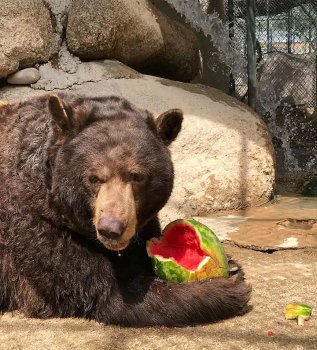
Igasho (courtesy of SWCC)
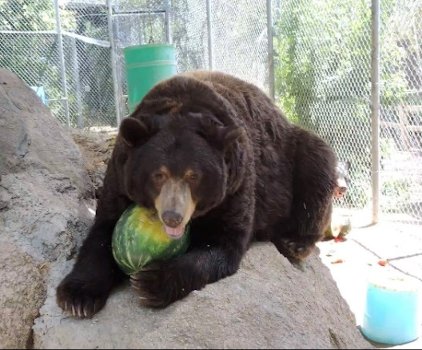
Photo from www.southwestwildlife.org
- Spectacled Bear Conservation Society
-
Spectacled Bear Conservation Society
In May 2012 we donated £100 (CAN$160) to The Spectacled Bear Conservation Society – Peru (SBC). The donation went towards the cost of their work to protect the spectacled bear, whose habitat is currently extremely threatened.
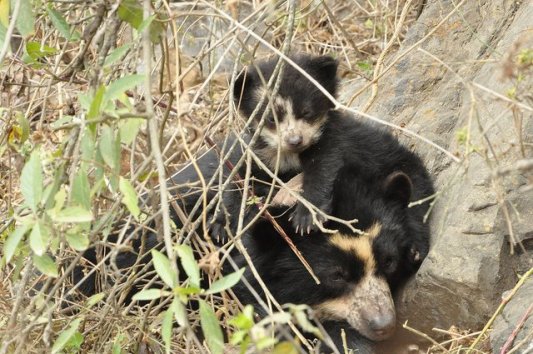
© All rights reserved by Spectacled Bear Conservation Society – Peru
- Sun Bear Outreach
-
Sun Bear Outreach
A brand new beneficiary of the Winton Foundation for the Welfare of Bears is Sun Bear Outreach. Founded in 2014 by Patrick Rouxel, the mission of Sun Bear Outreach is to raise local and international awareness on the sun bears, help improve the life of captive sun bears in Indonesia, reintroduce cubs to the wild and help put an end to the use of sun bears in Indonesian circuses. Sun Bear Outreach launched a new project in 2016 to help improve the living conditions of all the bears in the care of Borneo Orangutan Survival (BOS). There are presently 48 bears in the BOS refuge of Samboja Lestari in East Kalimantan, Borneo, Indonesia, and 13 bears in the BOS refuge at Nyaru Menteng in Central Kalimantan. These 61 sun bears are all adults who will never go back to the wild. They deserve the best possible captive life we can give them and that is what Sun Bear Outreach intends to do.
The group of 19 female sun bears – who stay permanently in the two outdoor enclosures called Middle Yard and Bottom Yard – have a pool which serves both for bathing and drinking. However, in the dry season the pool water quickly gets murky and dirty. The girls urgently needed a water basin they could drink from without being able to bathe in it, so our donation of £300 funded the cost of building two long drinking water basins, one for Middle Yard and one for Bottom Yard. These were placed close to the fence so that the staff can easily fill them up daily with a hose from the outside.
- ThaBarWa
-
The smart and very special bear cub
In 2016 Heather Bacon, WBF Board Member and highly experienced bear vet, brought to our attention the plight of a little bear in Myanmar named Nyen htoo (Nyen too), meaning ‘smart one’ in Burmese. The little cub, around 5 months old, was found alone – its mother probably a victim of poachers. He was taken in by the ThaBarWa meditation centre to save him being sold on into China. He was found with a terrible swelling on his tongue making it incredibly difficult for him to eat. Heather believed the swelling was a blockage of the cub’s salivary gland which was causing a build up of fluid. With treatment his chances were good, without treatment he would eventually die.
WBF therefore donated £500 to the cost of Heather travelling to Myanmar to treat the cub and, together with Free the Bears and Giving a Future Animal Aid, the balance of the costs was covered. We also launched an appeal to raise funds for the ongoing care costs of the cub (please see our summer 2016 newsletter for more details).
- Toilet Twinning
-
Toilet Twinning
In January 2016, after an article appeared in the Times of India, we reported on the incursion of sloth bears into the life of the local people in rural India. Many villages in this part of the world have no latrines and culture dictates that women and girls have to rise before dawn or wait until dark to go outside to relieve themselves. In the countryside they are in danger of attack by animals or bandits.
This prompted WBF to team up with the Five Sisters Zoo in West Lothian, home to rescued ex-circus bears Carmen, Suzy and Peggy, to collaborate with the well-established Toilet Twinning charity campaign which raises awareness of the sanitation crisis facing the world’s poor. WBF and Five Sisters Zoo jointly met the £240 cost of sponsoring a toilet block in Parsauni Baij School in India, an area where there is a high risk of human-animal conflict. This will help to improve hygiene, reduce the possibility of attack, protect humans and bears, empower women and girls, and encourage children to attend school. With the help of Toilet Twinning, toilets in the zoo’s Brown Bear Café were twinned with a new toilet block at the school.
- Turpentine Creek Wildlife Refuge
-
Turpentine Creek Wildlife Refuge
In June 2014 the Winton Bear Foundation selected a brand new beneficiary to support. For the first time, we sent a donation of £100 (US$170) to Turpentine Creek Wildlife Refuge based in Eureka Springs, Arkansas in the United States. TCWR’s mission is to provide a lifetime refuge for all rescued animals, with the care, safety, and wellbeing of the animals being the number one priority, treating them with the dignity and compassion they deserve. Although much of their work is with big cats they are also currently caring for six black bears and one Grizzly – the funds we have donated assisted with their care and we look forward to supporting them on an ongoing basis.
In winter 2018 we donated an additional £208 to Turpentine Creek Wildlife Refuge to assist with the care of their bears.
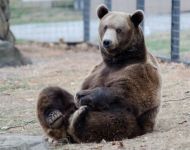
Bam Bam
(photo © Turpentine Creek Wildlife Refuge)
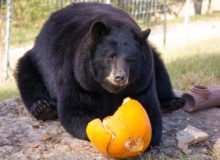
photo courtesy of Turpentine Creek Wildlife Refuge
- Valhalla Wilderness Society
-
Valhalla Wilderness Society
In April 2013 we donated £100 (approx CAN$160) to the Valhalla Wilderness Society, a brand new beneficiary of the Winton Bear Foundation. The Valhalla Wilderness Society is based in New Denver, BC, Canada. We are delighted to have started supporting them and this, we hope, will be the first of many contributions to their vital work to save the Kermode ‘Spirit’ Bear and its habitat.
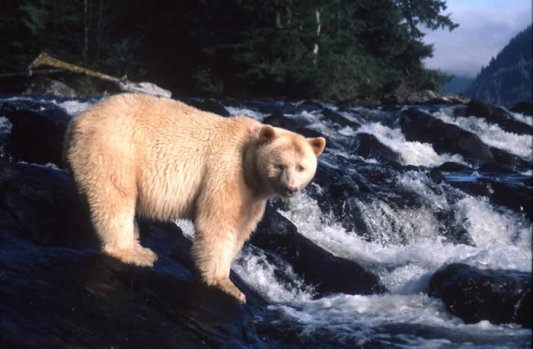
(photo courtesy of the Valhalla Wilderness Society)
In the winter of 2018 we were delighted to make another donation of £103 to the Valhalla Wilderness Society. In 1987, the Valhalla Wilderness Society started working with First Nations on a science-based program to establish a large wildlife sanctuary where the rare spirit bear roams in British Columbia’s coastal temperate rainforest. They also created an anti-poaching fund for illegal hunting of grizzly bears and white-phase Kermodes. They have recently hired a new Bear Smart coordinator for the Slocan Valley, BC where they live, our funding to be used towards her work in 2019.
- Wild Welfare
-
Wild Welfare
In Winter 2017 the Winton Foundation for the Welfare of Bears made a donation to Wild Welfare in order to provide enrichment for the bears currently resident in bear parks in Japan, including Hanako, an elderly resident at KumaKuma Bear Park in the Akita region. A report on these parks was written for us by Georgina Groves of Wild Welfare and the full report can be read in our Newsletter Issue 15.
Photos by courtesy of Georgina Groves.
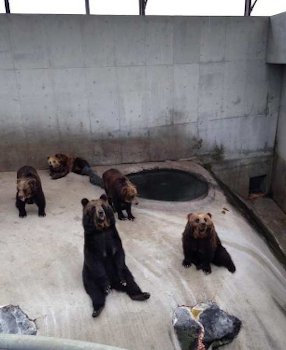
Group of bears at a Japanese Bear Park
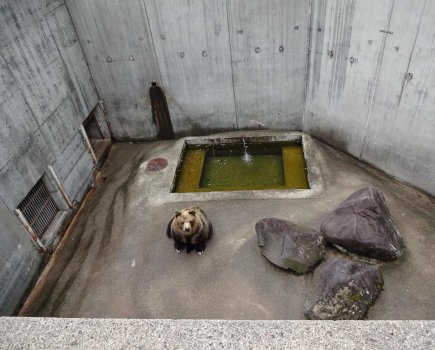
Hanako, aged 30, at KumaKuma Bear Park
- Wildlife Center of Virginia
-
Wildlife Center of Virginia
In summer 2019 we donated for the first time to The Wildlife Centre of Virginia. This is a hospital for native wildlife, teaching the world to care about and to care for wildlife and the environment since 1982. Our donation went directly towards the care of bears currently in their facility. Amanda Nicholson, Director of Outreach, told us: “We are (thankfully) having a smaller cub year (so far) than normal, but as you guys know, bears require long-term care, so we’ll be feeding and housing this group of cubs until next spring. We also recently admitted a 2½ year old bear with a severe case of mange, so he’s undergoing treatment but all seems to be going well so far.”
The Centre has been receiving bear cubs for many years – in 2013 they constructed a special Black Bear Complex, designed for bear cubs who need space in which to grow up. During the 2013 cub season, the Wildlife Centre successfully raised and released 15 bear cubs. The 2014 cub season “only” saw five cubs throughout the summer, while the 2015 cub season brought seven bear cubs who were raised and released. In 2016 the Wildlife Centre received a record-breaking 36 bears in total, many of whom were cubs.
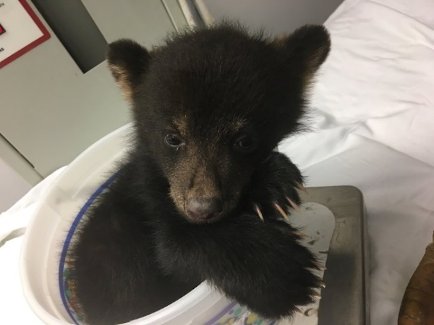
Photo Credit: www.wildlifecenter.org
- Wildlife SOS
-
Wildlife SOS
The Winton Bear Foundation is very proud to now be supporting the work of Wildlife SOS. Wildlife SOS are based in India and work tirelessly to end the spectacle of dancing bears and to care for bears saved from this distressing practice. We will continue to assist them on an ongoing basis with funds in order to help with the care of the bears in their rescue centres and to help them to create a more positive future for India’s bears.
- Wildlife Trust of India
-
Wildlife Trust of India
We are supporting the Wildlife Trust of India’s work to protect Sloth Bear dens during the weaning season, so that the cubs can’t be stolen to be used as dancing bears.
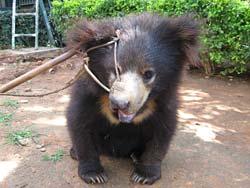
Cub forced into life as a dancing bear. Photo courtesy of International Animal Rescue.
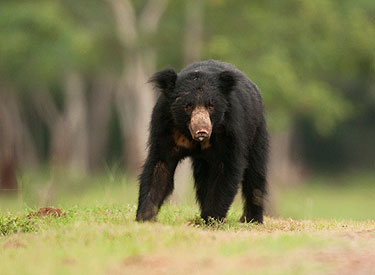
Sloth Bear. Photo courtesy of Wildlife Trust of India.
- Wildwood Trust
-
Wildwood Trust
In July 2014 we received an email from the Wildwood Trust in Kent, UK, informing us that they were launching an appeal to rescue two brown bears from horrendous living conditions in Bulgaria and bring them to live within the comfort and safety of their woodland. The bears were being kept in concrete pens in an abandoned bear breeding centre called Kormisosh. They were fed a bland diet and received no enrichment at all. They had never even seen a tree or walked on grass. We immediately offered to support them in any way that we could.
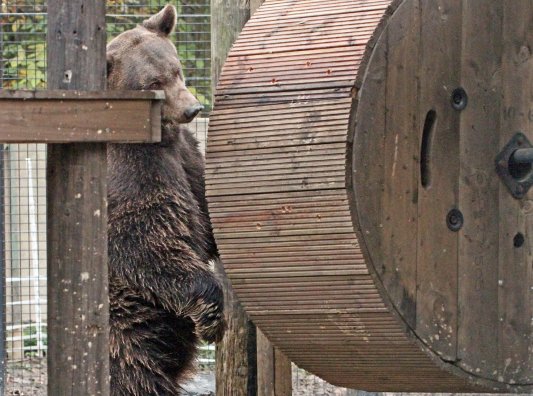
© Wildwood Trust
We made an initial donation of £200 to the rescue fund, then in November we held a highly successful raffle thanks to the amazing generosity of WBF supporters and were able to make a second payment of £600 to Wildwood. During the course of the raffle, we received the fantastic news that the bears had already been rescued and safely brought to the sanctuary. We were delighted to hear this news and very happy for our donation to go towards food, veterinary supplies and enrichment for the ongoing care and rehabilitation of the bears. We were sent these fabulous photos after the bears were rescued. You can only begin to imagine how happy and stimulated these bears are now. The main photo is of one of the boys playing with a big wheel Wildwood made for them – they pull down on it to make it spin and as it does, peanuts fall out! Some of the money WBF donated will go to purchasing nuts for the bears so that they can continue to benefit from this game, which builds their strength, practices logical thinking and provides them with an important, high calorie snack too. Fantastic!
All images © Wildwood Trust
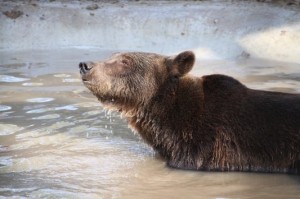
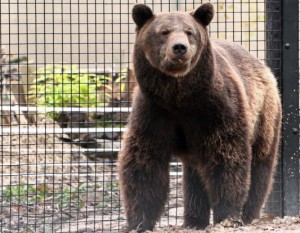
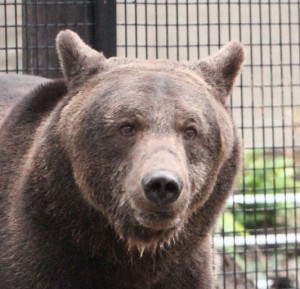
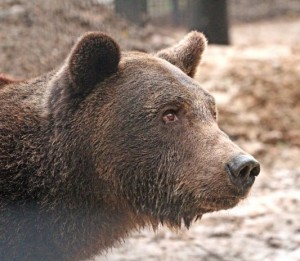
Those who are familiar with our work will know we have two special adopted bears Bodo and Max. Well in December 2016 we adopted our 3rd and 4th – Fluffy and Scruffy at the Wildwood Trust. We will renew each of our adoptions on an annual basis, helping to raise awareness of the dreadful conditions many bears are rescued from and the organisations trying to help them.
Wildwood rescued two brown bears in November 2014 from shocking neglect in a disused bear breeding station in Bulgaria. The bears were born at the centre and had lived their entire lives in tiny barren concrete cells. They had never experienced anything other than this life, were desperately underweight, and displaying signs of serious stress and anxiety. Wildwood rescued the bears and brought them to the UK where they are currently rehabilitating and can at last experience as natural a life as possible and have the chance to learn and express their natural behaviour.
When we heard that they were fundraising for another bear rescue, we were very happy to add £200 to the Wildwood Trust’s appeal in summer 2020. These new cubs were first discovered on the side of a mountain within a snow drift and their mother was nowhere to be seen. Their rescuers believe a disturbance caused them to go much higher into the mountains than they usually would. The bear cubs were too small and unable to follow their mother across the extremely steep and snowy incline in this area, so awaited her return in a snow drift at the bottom, luckily this was very close to an access road otherwise they may never have been found! When their rescuers first discovered them, they were reluctant to intervene in case their mother came back to look for them. They made several attempts to reunite the cubs with their mother, they even searched the area to try and find their original den, but unfortunately, she couldn’t be found. As their mother hadn’t returned and the cubs’ condition was fast deteriorating, it was decided it would be in their best interests to remove them and to provide veterinary care.
Bears In Mind and AWRT attempted to get the bears released back into the wild twice, but unfortunately both of those efforts failed. The rescuers were running out of places to turn and despite their best efforts the bears were now too old and too used to humans to be successfully released back into the wild. They needed a forever home. AWRT in collaboration with Tirana Zoo in Albania stepped in to help, assisted by Bears in Mind to arrange the next stage of their journey. The bear cubs were housed in a temporary holding facility in Belgium until they were transferred to a permanent, more suitable home. Work has begun at Wildwood’s park in East Devon, preparing a natural woodland home, where Mish and Lucy will be able to live full and happy lives.
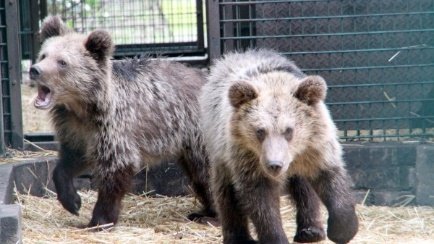
Photo Credit – wildwoodtrust.org
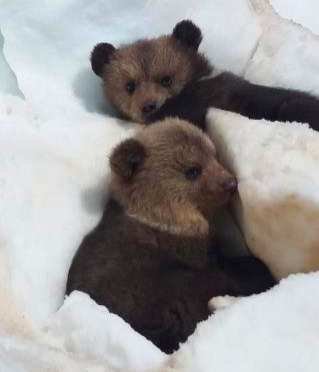
Photo Credit – wildwoodtrust.org
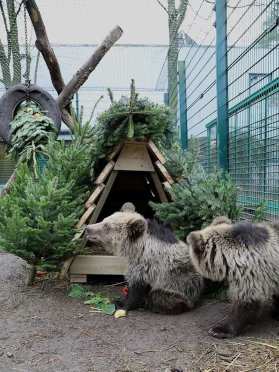
Photo Credit – wildwoodtrust.org
- Woodlands Wildlife Refuge
-
Woodlands Wildlife Refuge
In January 2013 we donated £100 to a new WBF beneficiary – Woodlands Wildlife Refuge, based in New Jersey, USA. They have been rescuing, rehabilitating and releasing Black Bears since 1995. Our funding helped pay for material needed to secure the fence in their large bear enclosure to make it impervious to mischievous bears and their claws! Because it wasn’t quite strong enough, WWR needed to wait until their rescued cubs were larger before moving them in to the bigger enclosure. However, it would be very beneficial for the cubs to be moved into the bigger enclosure sooner, so by helping fund the new fencing, we hoped WWR would be able to do this.
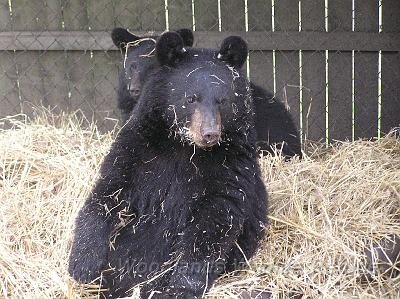
(photo courtesy of Woodlands Wildlife Refuge)
The Winton Foundation for the Welfare of Bears has pledged to help raise funds for a very special little bear called Grace who is currently a Special Care Permanent Resident at Woodlands Wildlife Refuge. Grace suffers from a condition called osteodystrophy which means her bones have developed abnormally, resulting in little stumpy legs. Sadly it is also thought that Grace is blind.
As Grace has aged, her physical and visual capabilities have begun to decline and she is troubled with osteoarthritis. As she moves into her senior years, we would like to help contribute to the costs of her medication, daily care, and any enclosure enrichment that would benefit an elderly lady with her special needs, to help keep her as comfortable as possible.
We made our first donation of £300 (US$485) to Grace in October 2013, then in November – £350 (US$560) and December – £140 (US$230). In 2014 we gave donations in February – £250 (US$410), March – £315 (US$525), June – £315 (US$509), September – £335 (US$550). To read more about Grace’s Appeal click here.
It is with great sadness that we received the news that Grace had died on 9th October 2014. It was an honour to take her under our wing for the last year of her life and to help Woodlands Wildlife in their wonderful care of such a special bear. She will never be forgotten.
- WSPA – Balkasar Sanctuary
-
WSPA – Balkasar Sanctuary
In November 2010 we made our first and biggest contribution to date to WSPA’s sanctuary in Balkasar, built to be a home for bears rescued from the brutal practice of bear baiting. Our donation was used to buy food and veterinary supplies desperately needed by these dreadfully exploited bears. Once they have been brought to the sanctuary, our assistance helped treat the terrible injuries sustained by these bears and then fill their tummies when they were feeling better!
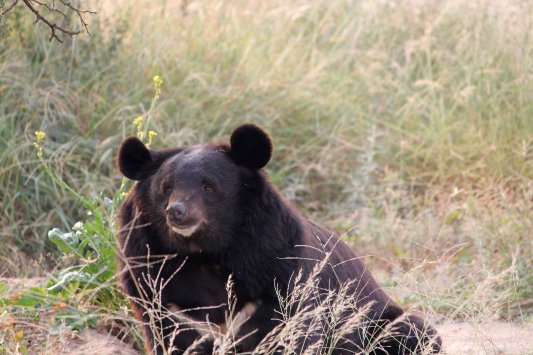
‘Sohrab’ relaxing in the Balkasar Sanctuary, rescued from the brutal practice of bear baiting.
Photo ©WSPA and the Bioresource Research Centre - Yellowstone Wildlife Sanctuary
-
Yellowstone Wildlife Sanctuary
A new beneficiary in 2020 was The Yellowstone Wildlife Sanctuary in Red Lodge, Montana, USA. Here lifelong sanctuary is provided for non-releasable native Montana wildlife. They provide their animals with natural and enriching lives, while sharing a message of education and conservation. They contacted us in February seeking funding for a stretcher to evacuate bears during an emergency, strong enough to hold a 500lb (255kg) bear! We sent a donation of £303 to purchase this “Bear Necessity”. A stretcher is the only way to transport a bear that has been sedated to a trailer, ensuring prompt and injury free transport. The type of emergency could include fires, floods, earthquakes or severe winter conditions. The stretcher allows evacuations to run much more smoothly. Read all about Yellowstone’s lovely bears in issue 18 of our newsletter.
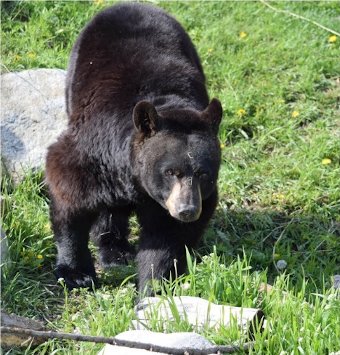
Winnie
Photo Credit – The Yellowstone Wildlife Sanctuary
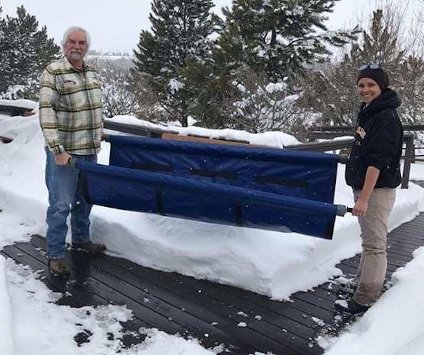
Photo Credit – The Yellowstone Wildlife Sanctuary

